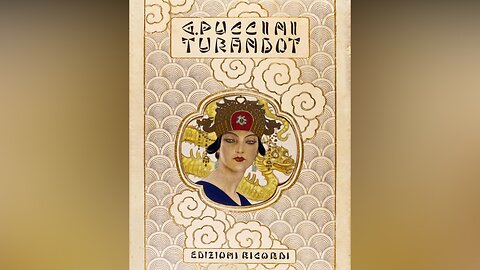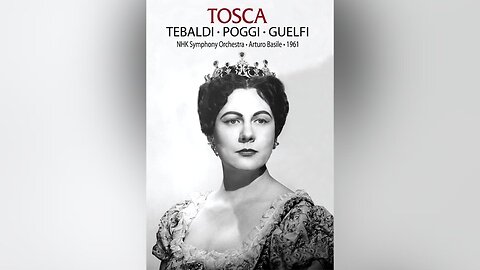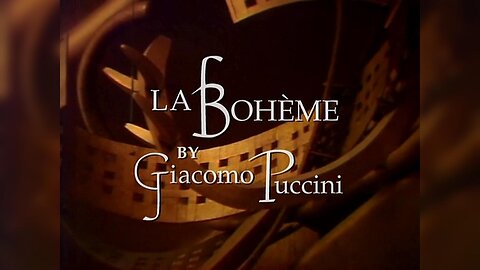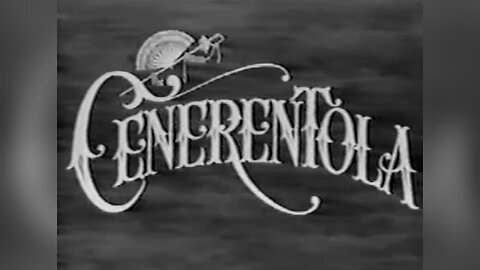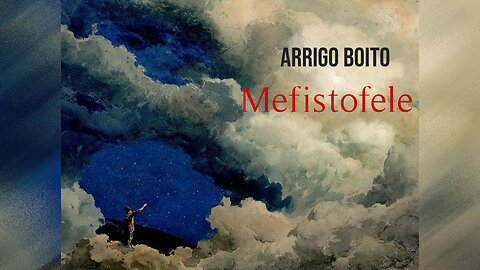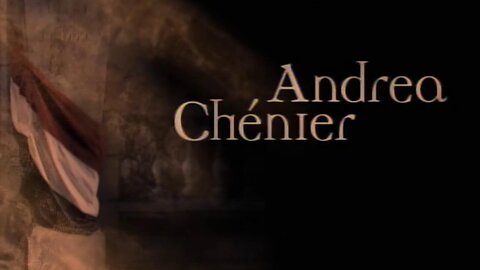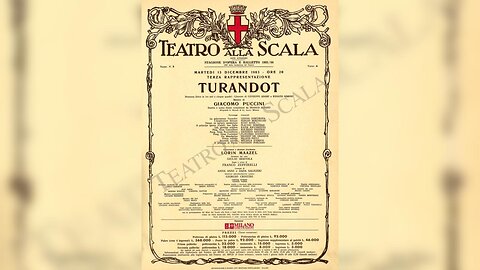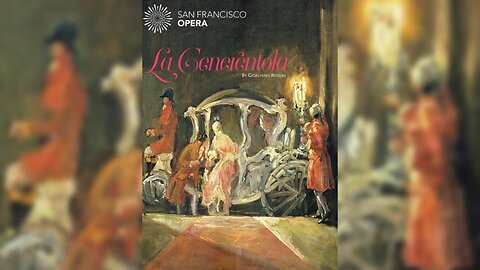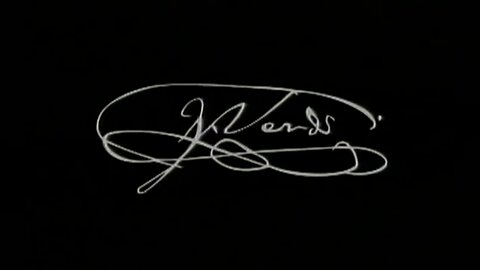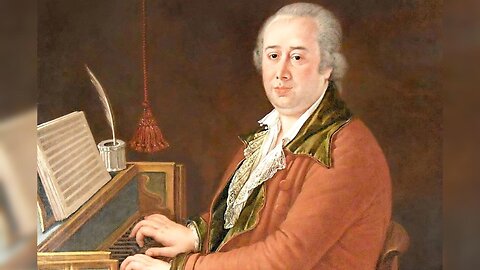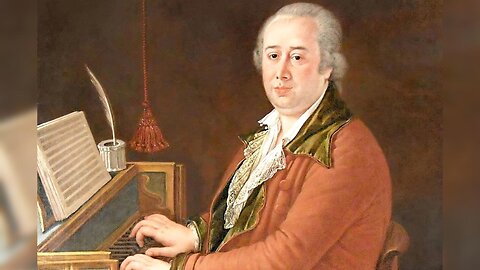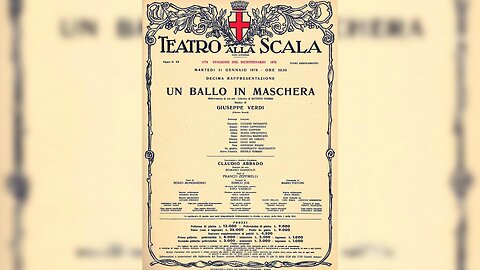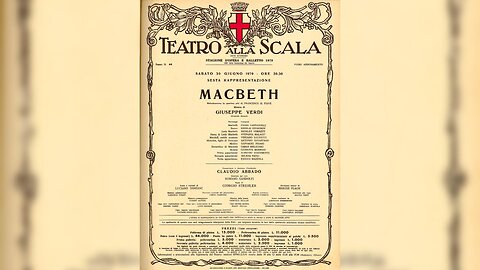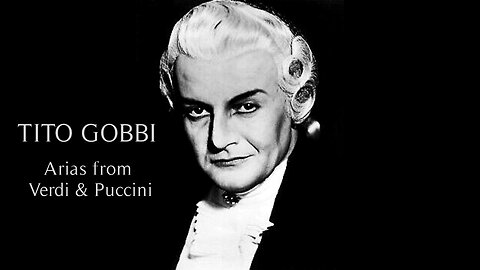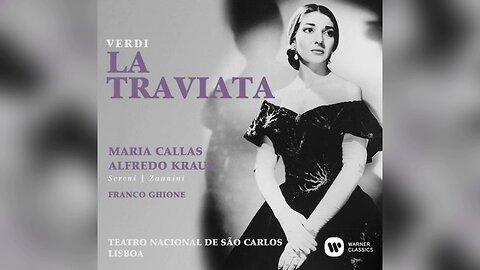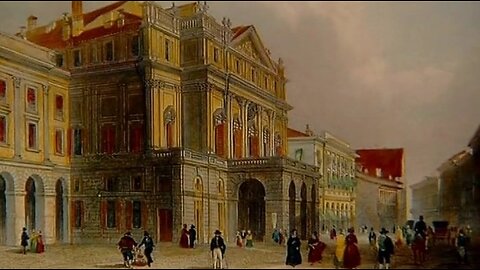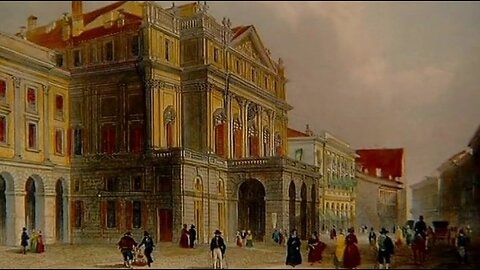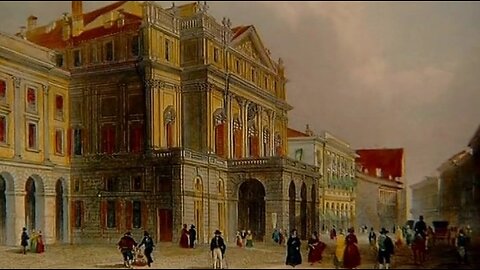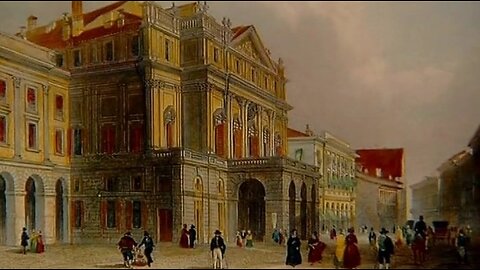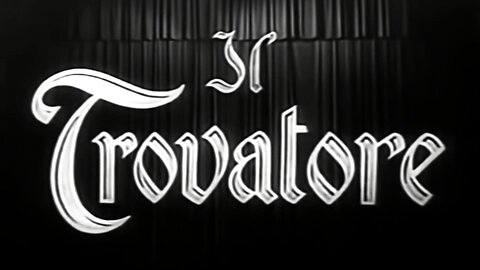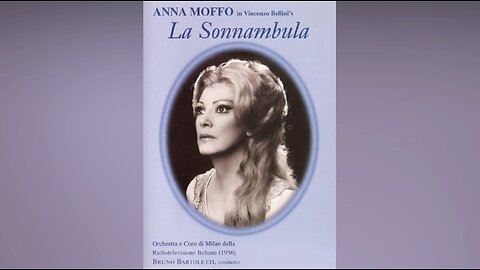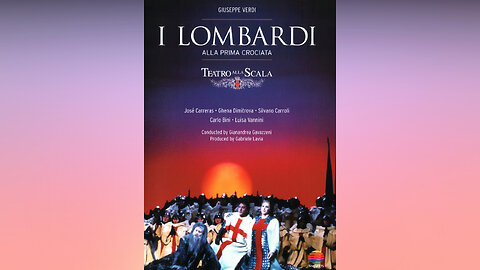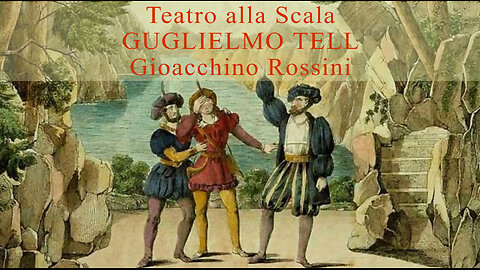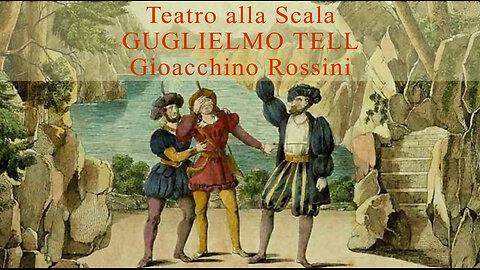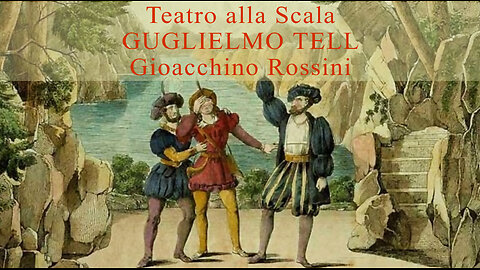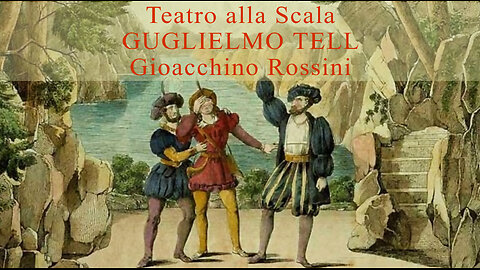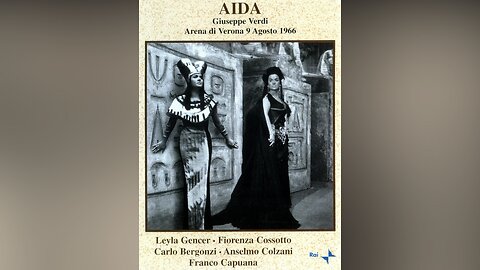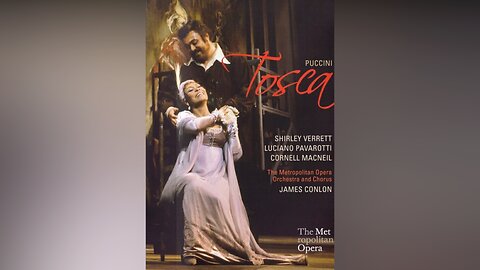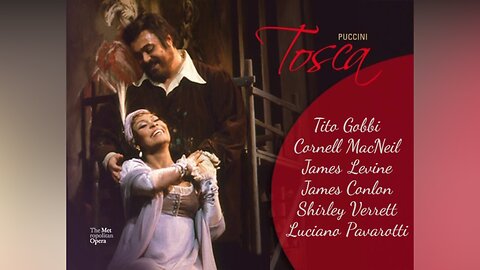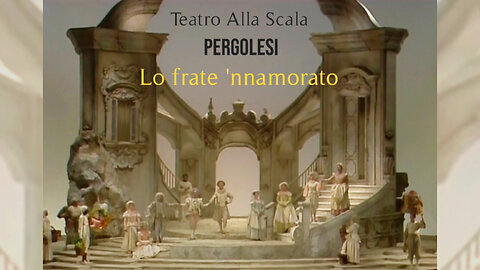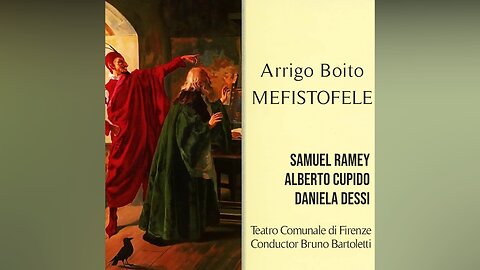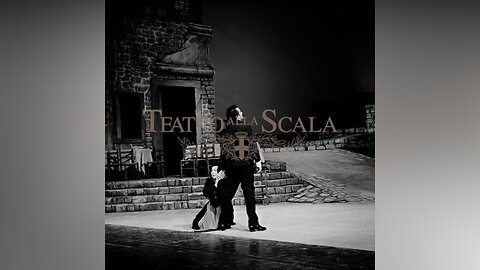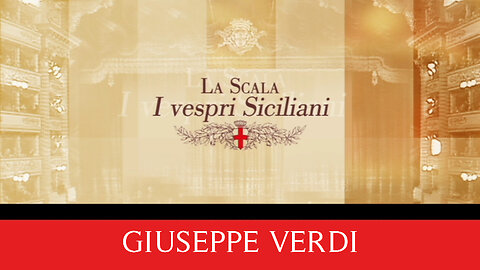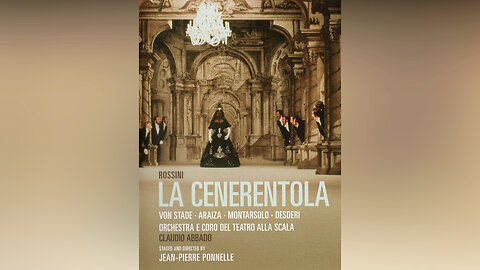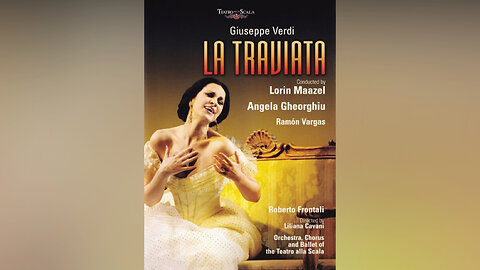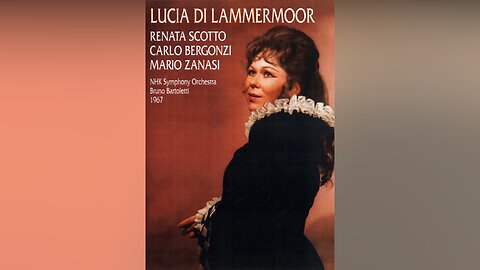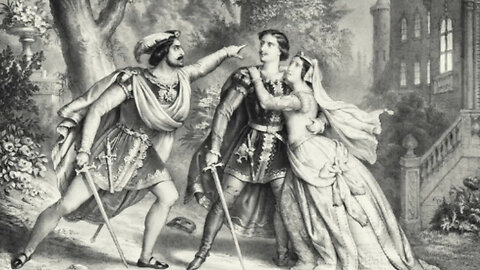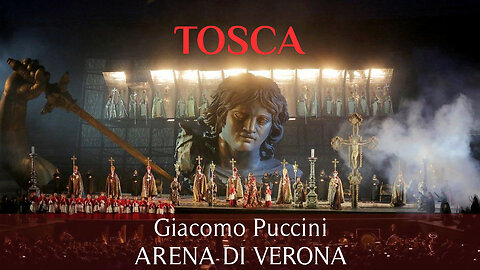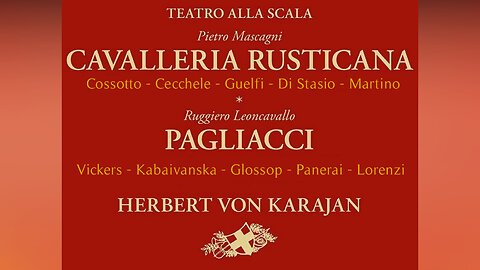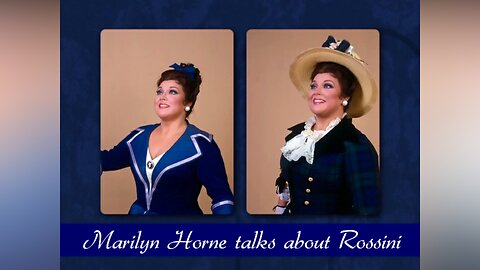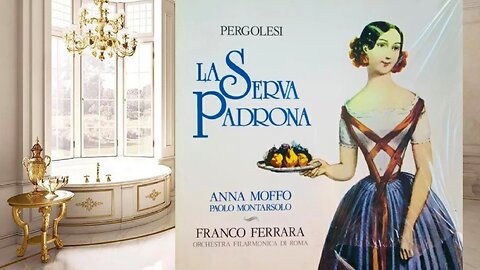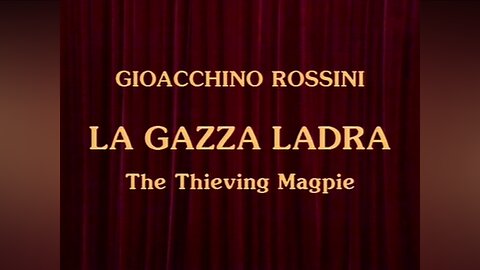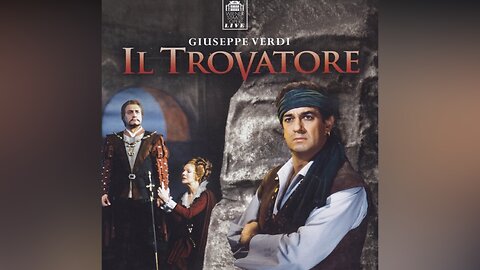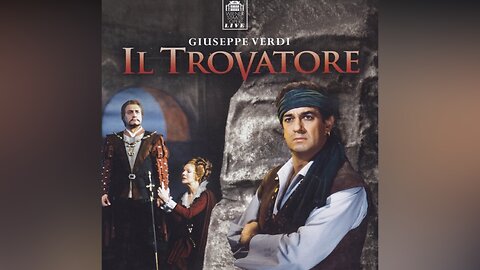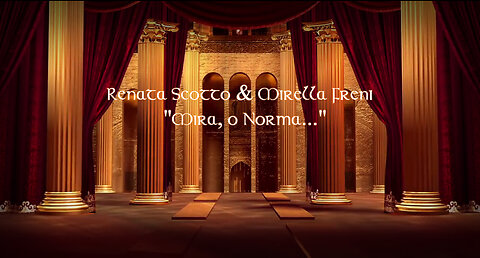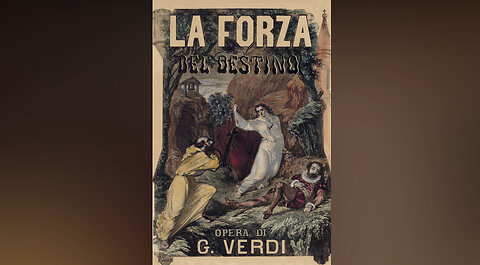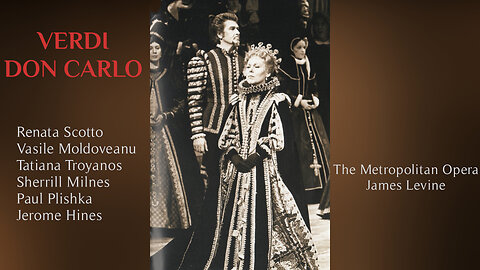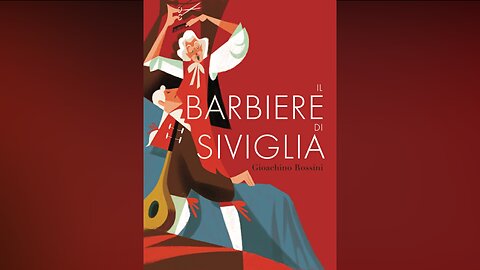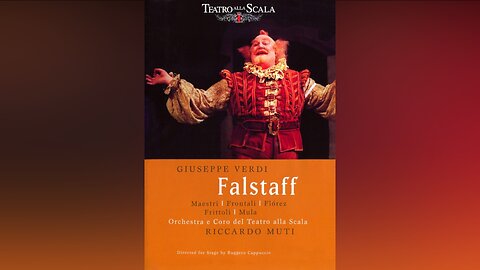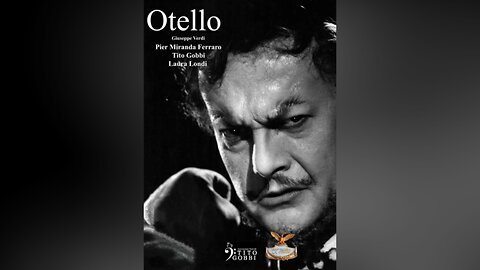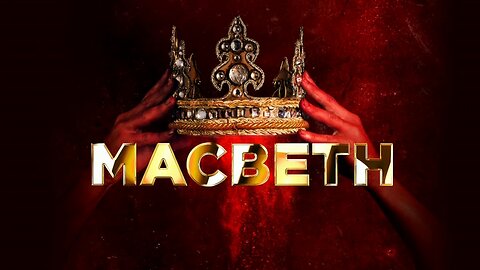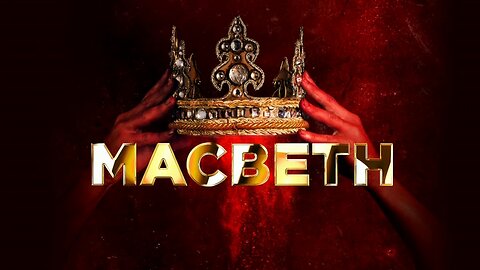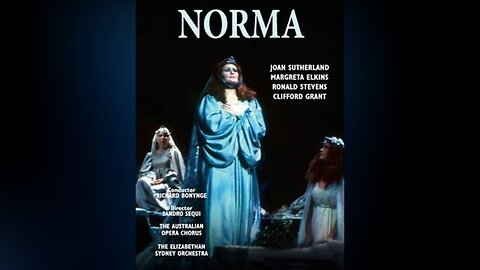Premium Only Content
This video is only available to Rumble Premium subscribers. Subscribe to
enjoy exclusive content and ad-free viewing.
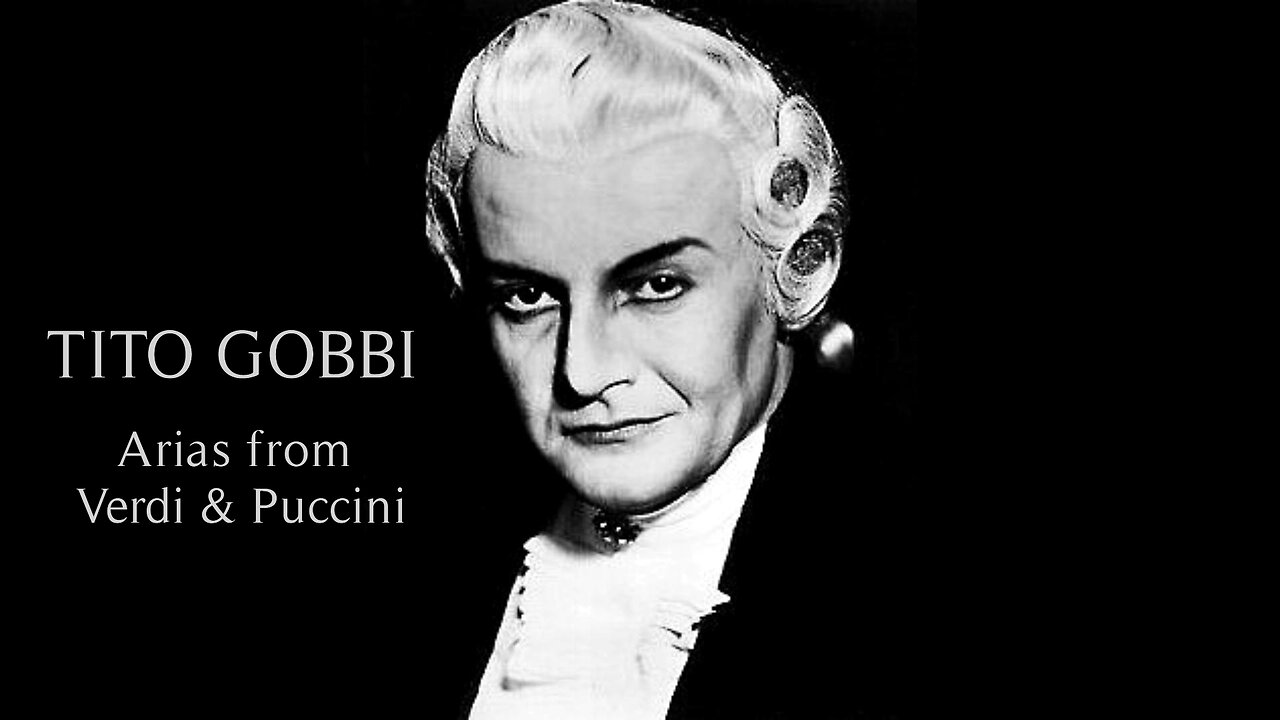
Italian Opera
AdanethArts
- 14 / 77
1
Puccini: Turandot | Birgit Nilsson, Cecchele, Tucci - Prêtre (RAI 1969)
Adaneth - Arts & Literature
Composer: Giacomo Antonio Puccini
Librettist: Giuseppe Adami, and Renato Simoni
Premiere: 25 April 1926, Milan (La Scala)
Language: Italian
Subtitles: None
Turandot Synopsis: https://www.opera-arias.com/puccini/turandot/synopsis/
Cast & Characters:
La principessa Turandot - Birgit Nilsson
Calaf - Gianfranco Cecchele
Liu - Gabriella Tucci
Ping - Claudio Strudthoff
Pang - Mario Ferrara
Pong - Carlo Franzini
Timur - Boris Carmeli
L'imperatore Altoum - Luigi Pontiggia
Un mandarino - Franco Bordoni
Prima ancella - Giannella Borelli
Seconda Ancella - Fernanda Cadoni
RAI Torino Orchestra & Chorus
Conductor: Georges Prêtre
Recorded in 1969
The opera is set in China and follows the Prince Calaf, who falls in love with the cold-hearted Princess Turandot. In order to win her hand in marriage, a suitor must solve three riddles, with a wrong answer resulting in his execution. Calaf passes the test, but Turandot refuses to marry him. He offers her a way out: if she is able to guess his name before dawn the next day, he will accept death.
Puccini died in 1924, and his opera was left unfinished. The music was completed by Franco Alfano and premiered on 25 April 1926, almost a year and a half after Puccini's death. Turandot premiered at the La Scala opera house in Milan, Italy, on 25 April 1926, a year and five months after Puccini's death. Rosa Raisa played Turandot. Tenors Miguel Fleta and Franco Lo Giudice alternated in the role of Prince Calaf, with Fleta singing the role on opening night. It was conducted by Arturo Toscanini. In the middle of Act III, the orchestra stopped playing. Toscanini turned to the audience and announced, "Qui finisce l'opera, perché a questo punto il maestro è morto" ("Here the opera ends, because at this point the maestro died"). The curtain was then lowered. The second and subsequent performances of the 1926 La Scala season included Alfano's ending.
2
Puccini: Tosca | Tebaldi, Poggi, Guelfi - Basile (Tokyo 1961)
Adaneth - Arts & Literature
Composer: Giacomo Antonio Puccini
Librettist: Giuseppe Giacosa, and Luigi Illica
Premiere: 14 January 1900, Rome (Teatro Costanzi)
Language: Italian
Subtitles: Japanise Hardcoded
Tosca Synopsis: https://www.opera-arias.com/puccini/tosca/synopsis/
Cast & Characters:
Renata Tebaldi as Tosca
Gianni Poggi as Cavaradossi
Gian Giacomo Guelfi as Scarpia
Silvano Pagliuca as Angelotti
Antonio Pirino as Spoletta
Giorgio Onesti as Sacristan
Arturo La Porta as Sciarrone/Jailor
Takako Kurimoto as Shepherd
The NHK Symphony Orchestra
Tokyo Broadcasting Chorus
NHK Italian Opera Chorus
Conductor: Arturo Basile
Live performance, October 22, 1961
Tokyo Bunka Kaikan
Tosca is an opera in three acts by Giacomo Puccini to an Italian libretto by Luigi Illica and Giuseppe Giacosa. It premiered at the Teatro Costanzi in Rome on 14 January 1900. The work, based on Victorien Sardou's 1887 French-language dramatic play, La Tosca, is a melodramatic piece set in Rome in June 1800, with the Kingdom of Naples's control of Rome threatened by Napoleon's invasion of Italy. It contains depictions of torture, murder, and suicide, as well as some of Puccini's best-known lyrical arias.
Tosca premiered at a time of unrest in Rome, and its first performance was delayed for a day for fear of disturbances. Despite indifferent reviews from the critics, the opera was an immediate success with the public. The dramatic force of Tosca and its characters continues to fascinate both performers and audiences, and the work remains one of the most frequently performed operas. Many recordings of the work have been issued, both of studio and live performances.
3
La Bohème | Scotto, Pavarotti, Wixell - Levine, Pizzi (MET 1977 - MULTISUB)
Adaneth - Arts & Literature
Composer: Giacomo Antonio Puccini
Librettist: Giuseppe Giacosa, and Luigi Illica
Premiere: 1 February 1896, Turin (Teatro Regio)
Language: Italian
Subtitles: Italian, English, German, French, Spanish (Click on CC for subtitles)
La Bohème Synopsis: https://www.opera-arias.com/puccini/la-boh%C3%A8me/synopsis/
Cast & Characters:
Renata Scotto as Mimi
Luciano Pavarotti as Rodolfo
Maralin Niska as Musetta
Ingvar Wixell as Marcello
Allan Monk as Schaunard
Paul Plishka as Colline
Italo Tajo as Benoit
Andrea Velis as Alcindoro
The Metropolitan Opera Orchestra and Chorus
Conductor: James Levine
Set and Costume Design: Pier Luigi Pizzi
Production by Fabrizio Melano
TV Director: Kirk Browning
La bohème is an opera in four acts, by Giacomo Puccini to an Italian libretto by Luigi Illica and Giuseppe Giacosa, based on Scènes de la vie de bohème by Henri Murger.
The story is set in Paris around 1830 and shows the Bohemian lifestyle (known in French as "la bohème") of a poor seamstress and her artist friends.
The world premiere of La bohème was in Turin on 1 February 1896 at the Teatro Regio, conducted by the 28-year-old Arturo Toscanini. Since then, La bohème has become part of the standard Italian opera repertory and is one of the most frequently performed operas internationally. According to Operabase, it is the fourth most frequently performed opera worldwide.
Puccini died in Brussels on 29 November 1924, and the news of his death reached Rome during a performance of La bohème. The opera was immediately stopped, and the orchestra played Chopin's Funeral March for the stunned audience.
In 1946, 50 years after the opera's premiere, Toscanini conducted a commemorative performance of it on radio with the NBC Symphony Orchestra. A recording of the performance was later released by RCA Victor on vinyl record, tape and compact disc. It is the only recording ever made of a Puccini opera by its original conductor.
As credited on its title page, the libretto of La bohème is based on Henri Murger's 1851 novel, Scènes de la vie de bohème, a collection of vignettes portraying young bohemians living in Paris in the 1840s. Although often called a novel, the book has no unified plot. Like the 1849 play drawn from the book by Murger and Théodore Barrière, the opera's libretto focuses on the relationship between Rodolfo and Mimì, ending with her death. Also like the play, the libretto combines two characters from the novel, Mimì and Francine, into the single character of Mimì.
Much of the libretto is original. Major sections of acts two and three are the librettists' invention, with only a few passing references to incidents and characters in Murger. Most of acts one and four follow the book, piecing together episodes from various chapters. The final scenes in acts one and four—the scenes with Rodolfo and Mimì—resemble both the play and the book. The story of their meeting closely follows chapter 18 of the book, in which the two lovers living in the garret are not Rodolphe and Mimì at all, but rather Jacques and Francine. The story of Mimì's death in the opera draws from two different chapters in the book, one relating Francine's death and the other relating Mimì's.
2
comments
4
Rossini: La Cenerentola | Afro Poli, Fedora Barbieri - Oliviero de Fabritiis (Opera Film 1949)
Adaneth - Arts & Literature
Cinderella is a 1949 Opera Film directed by Fernando Cerchio.
It is a film adaptation of Gioachino Rossini's opera of the same name, which in turn was inspired by Charles Perrault's fairy tale.
The film's interiors were shot at the Royal Palace of Turin, and the exteriors were filmed at the castles of Stupinigi and Tolcinasco, and at the Royal Palace of Monza.
Fernando Cerchio's "Cenerentola" is a good representation of Rossini's opera, almost in its entirety, with all singing and no spoken parts.
Cast: Lori Randi (voice of Fedora Barbieri), Gino Del Signore, Afro Poli, Vito De Taranto, Franca Tamantini (Tisbe, voice of Fernanda Cadoni Azzolini), Fiorella Carmen Forti (Clorinda), Enrico Formichi (Alidoro), Giuliana Rivera, Tina Zucchi. Orchestra and Chorus of the Rome Opera, conducted by Oliviero de Fabritiis; choirmaster Achille Consoli.
5
Boito: Mefistofele | Caballé, Giaiotti, Ordoñez - Collado (Liceu 1987-SPA SUB)
Adaneth - Arts & Literature
Composer: Arrigo Boito
Librettist: Arrigo Boito
Premiere: 5 March 1868. Milan (La Scala)
Language: Italian
Subtitles: Spanish
Synopsis: https://www.opera-arias.com/boito/mefistofele/synopsis/
Cast & Characters:
Mefistofele: Bolando Giaiotti
Faust: Antonio Ordoñez
Margherita: Montserrat Caballé
Marta: Rosa Maria Ysas
Wagner: Alfredo Heilbron
Elena: Agnes Habereder
Pantalis: Maria Uriz
Nereo: Antonio Comas
Chorus and Orchestra of Gran Teatre del Liceu
Conductor: Jose Collado
Chorus director: Romano Gandolfi
Stage Director: Emilio Sagi
Set Design & Costume: Toni Businger
Escolania de las Escuelas Pias Balmes
Conductor Antoni Coll
Production of the Teatro de la Zarzuela
December 4, 1987 - Gran Teatre del Liceu de Barcelona
Mefistofele is an Italian opera in a prologue and five acts, later reduced to four acts and an epilogue, the only completed opera with music by the Italian composer-librettist Arrigo Boito (there are several completed operas for which he was librettist only). It is an adaptation of the German legend of Faust. The opera was given its premiere on 5 March 1868 at La Scala, Milan, under the baton of the composer.
6
Giordano: Andrea Chénier | Pavarotti, Guleghina, Pons - Levine, Joel (MET 1997-MULTISUB)
Adaneth - Arts & Literature
Composer: Umberto Giordano
Librettist: Luigi Illica
Premiere: 28 March 1896, Milan (La Scala)
Language: Italian
Subtitles: Italian, English, French, German, Spanish
Synopsis: https://www.opera-arias.com/giordano/andrea-chenier/synopsis/
Cast & Characters:
Andrea Chénier, a poet: Luciano Pavarotti
Carlo Gérard, a servant: Juan Pons
Maddalena di Coigny: Maria Guleghina
Bersi, her maid: Wendy White
La comtesse di Coigny: Judith Christin
Pietro Fléville, a novelist: Christopher Schaldenbrand
Mathieu, a sans-culotte: Paul Plishka
The Abbé, a poet: Bernard Fitch
The Incredible, a spy: Michel Sénéchal
Major-domo: Bradley Garvin
Roucher, a friend of Chénier: Haijing Fu
Madelon, an old woman: Stephanie Blythe
Dumas, President of the Tribunal: Jeffrey Wells
Fouquier-Tinville, the Public Prosecutor: Yanni Yannissis
Schmidt, a jailer at St. Lazare: Richard Vernon
The Metropolitan Orchestra and Chorus
Conductor James Levine
Production Nicolas Joel
Set and Costume Designer: Humbert Monloup
TV Director Brian Large
Andrea Chénier is a verismo opera in four acts by Umberto Giordano, set to an Italian libretto by Luigi Illica, and first performed on 28 March 1896 at La Scala, Milan. The story is based loosely on the life of the French poet André Chénier (1762–1794), who was executed during the French Revolution. The character Carlo Gérard is partly based on Jean-Lambert Tallien, a leading figure in the Revolution.
It remains popular with audiences, though less frequently performed than in the first half of the 20th century. One reason for its survival in the repertoire is the lyrical-dramatic music provided by Giordano for the tenor lead, which gives a talented singer opportunities to demonstrate his skills and flaunt his voice. Giuseppe Borgatti's triumph in the title role at the first performance immediately propelled him to the front rank of Italian opera singers. He went on to become Italy's greatest Wagnerian tenor, rather than a verismo-opera specialist.
Apart from Borgatti, famous Chéniers in the period between the opera's premiere and the outbreak of World War II included Francesco Tamagno (who studied the work with Giordano), Bernardo de Muro, Giovanni Zenatello, Giovanni Martinelli, Aureliano Pertile, Francesco Merli, Beniamino Gigli, Giacomo Lauri-Volpi and Antonio Cortis. Enrico Caruso also gave a few performances as Chénier in London in 1907. Post-war, Franco Corelli, Richard Tucker and Mario Del Monaco were the most famous interpreters of the title role during the 1950s and 1960s.
In addition to four arias for the principal tenor ("Un dì all'azzurro spazio"; "Io non amato ancor"; "Si, fui soldato"; "Come un bel dì di maggio"), the opera contains a well-known aria ("La mamma morta") for the soprano heroine, which was featured in the film Philadelphia (the Maria Callas version is used on the soundtrack.) Also worth noting are the baritone's expressive monologue "Nemico della patria" and the final, rousing, soprano–tenor duet for the two leads as they prepare to face the guillotine ("Vicino a te").
7
Puccini: Turandot | Dimitrova, Domingo, Ricciarelli - Maazel, Zeffirelli (La Scala 1983)
Adaneth - Arts & Literature
Titolo: Turandot
Dramma lirico in tre atti e cinque quadri
Musica di Giacomo Puccini (L’ultimo duetto e il finale dell’opera sono stati completati da Franco Alfano.)
Libretto di Giuseppe Adami e Renato Simoni
Premiere: 25 Aprile 1926, Milano (La Scala)
Lingua: Italiano
Sottotitoli: Nessuno
Synopsis: https://www.opera-arias.com/puccini/turandot/synopsis/
Libretto: https://www.opera-arias.com/puccini/turandot/libretto/
English Translation: https://www.opera-arias.com/puccini/turandot/libretto/english/
Personaggi & Interpreti:
La Principessa Turandot: Ghena Dimitrova
L’Imperatore Altoum: Sergio Bertocchi
Timur, Re tartaro spodestato: Kurt Rydl
Il Principe Ignoto (Calaf), suo figlio: Placido Domingo
Liù, giovine schiava: Katia Ricciarelli
Ping, Gran Cancelliere: Rolando Panerai
Pang, Gran Provveditore: Ernesto Gavazzi
Pong, Gran Cuciniere: Florindo Andreolli
Un Mandarino: Franco De Grandis
Prima ancella: Milena Pauli
Seconda ancella: Mildela D'Amico
Il principe di Persia: Saverio Porzano
Concertatore e direttore d'orchestra: Lorin Maazel
Direttore del coro: Giulio Bertola
Regia e scene di Franco Zeffirelli
Costumi di Anna Anni e Dada Saligeri
Corpo di Ballo del Teatro alla Scala
Terza rappresentazione, 13 Dicembre 1983
Stagione d'Opera e Balletto 1983/1984
8
Rossini: La Cenerentola | Deshayes, Barbera, Solis, Van Horn (San Francisco Opera 2014)
Adaneth - Arts & Literature
Title: La Cenerentola, ossia La bontà in trionfo
Composer: Giaochino Rossini
Librettist: Jacopo Ferretti
Premiere: 25 January 1817, Rome (Teatro Valle)
Language: Italian
Subtitles: None
Cast & Characters:
Cenerentola - Karine Deshayes
Don Ramiro - René Barbera
Dandini - Efraín Solís
Alidoro - Christian Van Horn
Clorinda - Maria Valdes
Tisbe - Zanda Švēde
Don Magnifico - Carlos Chausson
San Francisco Opera Orchestra & Chorus
Conductor: Jesús López-Cobos
Stage Director: Gregory Fortner
The production revived is the 1967 design by Jean-Pierre Ponnelle.
La Cenerentola, ossia La bontà in trionfo ("Cinderella, or Goodness Triumphant") is an operatic dramma giocoso in two acts by Gioachino Rossini. The libretto was written by Jacopo Ferretti, based on the libretti written by Charles-Guillaume Étienne for the opera Cendrillon with music by Nicolas Isouard (first performed Paris, 1810) and by Francesco Fiorini for Agatina, o la virtù premiata [it] with music by Stefano Pavesi (first performed Milan, 1814). All these operas are versions of the fairy tale Cendrillon by Charles Perrault. Rossini's opera was first performed in Rome's Teatro Valle on 25 January 1817.
9
10
11
Cimarosa: Il fanatico burlato - Act I (Drottningholm Slottsteater 1983 - GER SUB)
Adaneth - Arts & Literature
Title: Il fanatico burlato
Composer: Cimarosa Domenico
Libretto: Francesco Saverio Zini
Act II: https://rumble.com/v6y7mg2-cimarosa-il-fanatico-burlato-act-ii-drottningholm-slottsteater-1983-ger-sub.html
Interpreters: Björn Asker, Ursula Reinhardt-Kiss, Magnus Linden, Francis Egerton, Ulla Severin, Stefan Dahlberg.
Orchestra of the Drottningholm Slottsteater
Conductor: Carlo Felice Cillario
Stage Director: Peter Oskarsson
Il fanatico burlato is a dramma giocoso in two acts by Domenico Cimarosa with a libretto by Francesco Saverio Zini.
It was first performed at the Teatro del Fondo in Naples in the spring of 1787. It was later revised and translated into German and performed as Der adelsüchtige Bürger in Mannheim in 1791.
The story revolves around the protagonist Don Fabrizio, an eccentric baron of the phantom territory of Cocomero, who is seduced by his daughter's lover and, in a Turkish farce, is named Grand Mammalucco.
12
Verdi: Un Ballo in Maschera | Pavarotti, Cappuccilli-Abbado, Zeffirelli (La Scala 1978-ENG&ITA SUB)
Adaneth - Arts & Literature
Title: Un Ballo in Maschera
Melodrama in three acts
Composer: Giuseppe Verdi
Librettist: Antonio Somma
Premiere: 17 February 1859, Rome (Teatro Apollo)
Language: Italian
Subtitles: English, Italian (click on CC)
Performance of January 31, 1978
Orchestra and Chorus of La Scala Theatre
Cast & Characters:
Riccardo: Luciano Pavarotti
Renato: Piero Cappuccilli
Amelia: Mara Zampieri
Ulrica: Elena Obraztsova
Oscar: Daniela Mazzucato
Silvano: Luigi De Corato
Samuel: Luigi Roni
Tom: Giovanni Foiani
A judge: Gianfranco Manganotti
Amelia's Servant: Regolo Romani
Concertmaster and Conductor: Claudio Abbado
Director: Franco Zeffirelli
Set Designer: Renzo Mongiardino
Costumes Designer: Enrico Job
Choreography Designer: Mario Pistoni
Stage Director: Tito Varisco
Season: 1977/1978
Un ballo in maschera ('A Masked Ball') is an 1859 opera in three acts by Giuseppe Verdi. The text, by Antonio Somma, was based on Eugène Scribe's libretto for Daniel Auber's 1833 five act opera, Gustave III, ou Le bal masqué.
The plot concerns the assassination in 1792 of King Gustav III of Sweden who was shot, as the result of a political conspiracy, while attending a masked ball, dying of his wounds thirteen days later.
It was to take over two years between the commission from Naples, planned for a production there, and its premiere performance at the Teatro Apollo in Rome on 17 February 1859. In becoming the Un ballo in maschera which we know today, Verdi's opera (and his libretto) underwent a significant series of transformations and title changes, caused by a combination of censorship regulations in both Naples and Rome, as well as by the political situation in France in January 1858. Based on the Scribe libretto and begun as Gustavo III set in Stockholm, it became Una vendetta in domino set in Stettin, and finally Un ballo in maschera set in Boston during the colonial era. It became one of the most frustrating experiences of Verdi's career.
From the mid-20th century, it has become more common for the setting to revert to its original 18th-century Stockholm location. The opera has become a staple of the repertoire and is now performed frequently.
Notes: The file is directly from La Scala TV and it is not compressed. The audio and video quality reflects the television standards of the time.
13
Verdi: Macbeth | Verrett, Cappuccilli, Ghiaurov - Abbado, Strehler (La Scala 1979-ENG&ITA SUB)
Adaneth - Arts & Literature
Composer: Giuseppe Verdi
Librettist: Francesco Maria Piave
Premiere: 14 March 1847, Teatro della Pergola, Florence (Original Version in Italian)
Language: Italian
Subtitles: Italian, English (click on CC for subtitles)
Macbeth Synopsis: https://www.opera-arias.com/verdi/macbeth/synopsis/
Orchestra and Chorus of the Teatro alla Scala
Concertmaster and conductor: Claudio Abbado
Chorus director: Romano Gandolfi
Stage Director: Giorgio Strehler
Sets and costumes: Luciano Damiani
Mime movements: Marise Flach
Cast & Characters:
Macbeth: Piero Cappuccilli
Banco: Nicolaj Ghiaurov
Lady Macbeth: Shirley Verrett
Lady Macbeth's Lady: Stefania Malagú
Macduff: Veriano Luchetti
Malcolm: Antonio Savastano
Doctor: Giovanni Foiani
Macbeth's Servant: Carlo Meliciani
Hitman: Giuseppe Morresi
First Appearance: Alfredo Giacomotti
Second Appearance: Milena Pauli
Third Appearance: Enrico Mazzola
Recorded Live: Saturday, June 30, 1979 (Sixth performance)
TV Director: Carlo Battistoni
Season: 1979
Teatro alla Scala
Season number: 390
First performance date: Tuesday, April 24, 1979
Teatro alla Scala
Macbeth is an opera in four acts by Giuseppe Verdi, with an Italian libretto by Francesco Maria Piave and additions by Andrea Maffei, based on Shakespeare's play of the same name. Written for the Teatro della Pergola in Florence, Macbeth was Verdi's tenth opera and premiered on 14 March 1847. It was the first Shakespeare play that Verdi adapted for the operatic stage. Almost twenty years later, Macbeth was revised and expanded into a French version and given in Paris on 21 April 1865.
The first version of Macbeth was completed during the time that Verdi described as his "galley years," which ranged over 16 years and one that saw the composer produce 22 operas. By the standards of the subject matter of almost all Italian operas during the first fifty years of the 19th century, Macbeth was highly unusual. The 1847 version was very successful, and it was presented widely. The 1865 revision, produced in a French translation and with several additions, was first given on 21 April. It was less successful, and the opera largely faded from public view until the mid-20th century revivals. In Italian, the opera was given at La Scala in the autumn of 1865, but few, if any, others in Italy appear to have been presented. Since its revival in Europe in the 1960s, the revised version of Macbeth in Italian remains the preferred version for modern performances, although usually, the death scene from the first version is often interpolated in the last act.
2
comments
Tito Gobbi: Arias from Verdi and Puccini
Adaneth - Arts & Literature
1. "Pari Siamo!" (From Rigoletto)
2. "Cortigiani, vil razza dannata" (From Rigoletto - Staged for TV)
3. "Mio padre!... Dio! mia Gilda!", "Tutte le feste al tempio" with Renata Scotto (From Rigoletto - Staged for TV)
4. "Si, vendetta..." with Renata Scotto (From Rigoletto - Staged for TV)
5. "Vanne...Credo in un Dio crudel." (From Otello - BBC Studios 1958)
6. "Nulla...Silenzio..." (From Il Tabarro - Recital RAI 1963)
7. "Tre sbirre...Va Tosca! (Te Deum) (From Tosca - BBC Studios 1965)
9. "Il balen del suo sorriso" (From Il Trovatore - Opera Live)
10. "Alzati...Eri tu..." (From Un Ballo in Maschera - Staged for TV)
This is a collage that I put together with various video clips. I tried to improve the video&audio quality as much as I could.
15
Maria Callas: La Traviata Excerpt (Lisbon 1958)
Adaneth - Arts & Literature
An excerpt of a memorable performance from soprano Maria Callas at the São Carlos theater, on March 27, 1958, where she played Violetta in the opera "La Traviata", by Giuseppe Verdi, opposite tenor Alfredo Kraus, in the role of Alfredo.
17
La regia nell'opera lirica: Franco Zeffirelli
Adaneth - Arts & Literature
Luca Ronconi: https://rumble.com/v6tisvv-la-regia-nellopera-lirica-luca-ronconi.html
18
La regia nell'opera lirica: Giorgio Strehler
Adaneth - Arts & Literature
Franco Zeffirelli: https://rumble.com/v6tistn-la-regia-nellopera-lirica-franco-zeffirelli.html
19
La regia nell'opera lirica: Luchino Visconti
Adaneth - Arts & Literature
Un viaggio nella regia lirica dell’opera verdiana, a cura di Cesare Scarton con la regia di Maria Teresa de Vito, che prende in considerazione gli spettacoli di quattro grandi interpreti del nostro tempo: Luchino Visconti, Franco Zeffirelli, Giorgio Strehler, Luca Ronconi.
Vengono così analizzati alcuni allestimenti che hanno fatto epoca e che hanno segnato un profondo rinnovamento nella storia della regia lirica del Novecento. La traviata di Visconti, Otello di Zeffirelli, Simon Boccanegra di Strehler e Don Carlo di Ronconi sono così le tappe di un approccio profondamente innovativo nei confronti dell’opera lirica, nel quale la figura del regista assume un ruolo insostituibile nella resa del dettato drammaturgico del compositore, chiudendo per sempre l’epoca di un teatro musicale unicamente assoggettato alle leggi della vocalità.
Giorgio Strehler: https://rumble.com/v6tispx-la-regia-nellopera-lirica-giorgio-strehler.html
20
Il Trovatore - Salvarezza, Sacchi, Mascherini, Pederzini - Santini, Gallone (Opera Film 1949)
Adaneth - Arts & Literature
Il trovatore è un film del 1949 diretto da Carmine Gallone. Trasposizione cinematografica dell'omonima opera lirica di Giuseppe Verdi.
Interpreti & Personaggi
Vittorina Colonnello: Leonora
Gino Sinimberghi: Manrico
Gianna Pederzini: Azucena
Enzo Mascherini: conte di Luna
Enrico Formichi: Ruiz
Cesare Polacco: Ferrando
Leonora Amaya: zingarella
Giuseppe Varni: vecchio conte di Luna
Raimondo van Riel: vecchio zingaro
Mario Besesti: narratore
Interpreti Lirici:
Franca Sacchi: Leonora
Gianna Pederzini: Azucena
Antonio Salvarezza: Manrico
Enzo Mascherini: conte di Luna
Enrico Formichi: Ruiz
Maestro Concertatore & Direttore d'Orchestra: Gabriele Santini
Orchestra & Coro: Teatro dell'Opera di Roma
Adattamento & Sceneggiatura: Mario Corsi, Tullio Covaz, Ottavio Poggi, Carmine Gallone
Fotografia: Aldo Giordani
Scenografia: Gastone Medin
Costumi: Dario Cecchi
1
comment
21
Bellini: La Sonnambula | Moffo, Vega, Clabassi, Galli - Bartoletti (RAI 1956-ENG SUB)
Adaneth - Arts & Literature
La Sonnambula
Composer: Vincenzo Bellini
Librettist: Felice Romani
Premiere: 6 March 1831, Milan (Teatro Carcano)
Language: Italian
Subtitles: English
La sonnambula (The Sleepwalker) is an opera semiseria in two acts, with music in the bel canto tradition by Vincenzo Bellini set to an Italian libretto by Felice Romani, based on a scenario for a ballet-pantomime written by Eugène Scribe and choreographed by Jean-Pierre Aumer called La somnambule, ou L'arrivée d'un nouveau seigneur. The ballet had premiered in Paris in September 1827 at the height of a fashion for stage works incorporating somnambulism.
The role of Amina was originally written for the soprano sfogato Giuditta Pasta and the tenor Giovanni Battista Rubini, but during Bellini's lifetime another soprano sfogato, Maria Malibran, was a notable exponent of the role. The first performance took place at the Teatro Carcano in Milan on 6 March 1831.
The phrase Ah! non credea mirarti / Sì presto estinto, o fiore ("I did not believe I would see you fade so soon, oh flower") from Amina's final aria is inscribed on Bellini's tomb in the Catania Cathedral in Sicily.
Cast & Characters:
Amina - Anna Moffo
Elvino - Danilo Vega
Rodolfo - Plinio Clabassi
Lisa - Gianna Galli
Alessio - Guido Mazzini
Notaro - Giuseppe Nessi
Teresa - Anna Maria Anelli
RAI Milano Orchestra & Chorus
Conductor: Bruno Bartoletti
Rec. 1956
Synopsis: ACT I
The inhabitants of a small Swiss village are celebrating the forthcoming marriage of the orphan Amina and the wealthy farmer Elvino. The feudal lord Rodolfo, who is returning home after the death of his father, arrives to stay at the inn, where he flirts with Lisa, the hostess.
Suddenly a window openv , through which enters Amina. Lisa, jealous of Amina and her engagement to Elvino, hurries off to tell him of his fiancée's seeming assignation with Rodolfo. Rodolfo realizes that Amina is sleepwalking and, moved by her somnambulistic declaration of love, he leaves her on his couch. Lisa and Elvino arrive to denounce Amina as an adulteress. Elvino calls off the wedding.
ACT II
The village rallies round the distraught Amina and marches towards the castle to beg Rodolfo for verification of Amina's innocence. Amina is met on the way by Elvino, who rejects her and takes back his ring. He has decided to marry Lisa, who publicly rejoices in her good fortune. Rodolfo attempts to explain the truth, but Elvino is unconvinced by the tale of his fiancées somnambulism. The crowd is then distracted by the sight of Amina walking across the roof of the mill. When she reaches the ground, she is heard praying for the return of Elvino's love. Moved by her devotion, Elvino replaces the ring on her finger. She wakes to find Elvino kneeling at her feet. The crowd rejoices as the lovers head towards the church and their wedding.
2
comments
22
Donizetti: L'Elisir d'amore | Scotto, Bergonzi, Taddei - Gavazzeni (Maggio Musicale Fiorentino 1967)
Adaneth - Arts & Literature
L' Elisir d'amore
Composer: Gaetano Donizetti
Librettist: Felice Romani
Premiere: 12 May 1832, Milan (Teatro Canobbiana)
Language: Italian
Subtitles: Italian, English (Click on CC)
Synopsis: https://www.opera-arias.com/donizetti/l'elisir-d'amore/synopsis/
Adina - Renata Scotto
Nemorino - Carlo Bergonzi
Dulcamara - Carlo Cava
Belcore - Giuseppe Taddei
Giannetta - Renza Jotti
Maggio Musicale Fiorentino Orchestra & Chorus
Maestro Concertatore e Direttore: Gianandrea Gavazzeni
Maestro del Coro: Adolfo Fanfani
Stage Director: Isabella Quarantotti De Filippo
rec. 1967
L'elisir d'amore (The Elixir of Love) is a melodramma giocoso (comic melodrama, opera buffa) in two acts by the Italian composer Gaetano Donizetti. Felice Romani wrote the Italian libretto, after Eugène Scribe's libretto for Daniel Auber's Le philtre (1831). The opera premiered on 12 May 1832 at the Teatro della Canobbiana in Milan.
Written in haste in a six-week period, L'elisir d'amore was the most often performed opera in Italy between 1838 and 1848 and has remained continually in the international opera repertory. Today it is one of the most frequently performed of all Donizetti's operas. The central narrative theme, the triumph of sincerity, is essential to the Romantic outlook; musically, in Donizetti's hands, the treatment became more romantic than in the Auber version: L'elisir d'amore features three big duets between the tenor and soprano.
The premiere of L'elisir d'amore took place at the Teatro della Canobbiana, Milan, on 12 May 1832. Today, the opera is part of the standard repertory. Enrico Caruso played in the role of Nemorino for the first time in February 1901 at La Scala with the conductor Arturo Toscanini. The audience reception caused Caruso and the orchestra to repeat "Una furtiva lagrima" three times.
23
Paisiello: Il Barbiere di Siviglia | Giovanni Paisiello Festival (Teatro Orfeo 2005-MULTI SUB)
Adaneth - Arts & Literature
Il barbiere di Siviglia, ovvero La precauzione inutile (The Barber of Seville, or The Useless Precaution)
Composer: Giovanni Paisiello
Librettist: Giuseppe Petrosellini
Premiere: 26 September 1782 (Imperial Court, Saint Petersburg)
Language: Italian
Subtitles: Italian, English (Click on CC)
Cast & Characters:
Conte d'Almaviva - Mirco Guadagnini
Figaro - Donato di Gioia
Rosina - Stefania Donzelli
Don Basilio - Paolo Bordogna
Don Bartolo - Maurizio Lo Piccolo
Un giovinettо/Un Alcade - Camillo Facchino
Lo svegliato/Un notaro - Graziano Da Pace
Marcellina (personaggio aggiunto) - Roberto Recchia
Orchestra da Camera del Giovanni Paisiello Festival
Conductor: Giovanni Di Stefano
Stage Director: Rosetta Cucchi
rec. Teatro Orfeo, Taranto, 2005
The opera was first performed on 26 September [O.S. 15] 1782 at the Imperial Court, Saint Petersburg. It was adapted from the 1775 play Le Barbier de Séville of Pierre Beaumarchais. The full title for the opera reads: Il barbiere di Siviglia, ovvero La Precauzione inutile, dramma giocoso per musica tradotto liberamente dal francese, da rappresentarsi nel Teatro Imperiale del corte, l'anno 1782 (Trans: "The Barber of Seville, or The Useless Precaution, comical drama with music freely translated from the French, presented at the Imperial Court Theater, the year 1782").
The story essentially follows the original Beaumarchais play, and in some places directly translates songs and dialogue. The plots of the Paisiello and the Rossini versions very closely resemble each other, with subtle differences.
Several musical adaptations of Il barbiere di Siviglia predated the version by Paisiello, but Paisiello's comic opera was the first to achieve widespread success. It was subsequently staged in several cities in the years immediately following its premiere, including Vienna, where Il barbiere played at five venues from 1783 until 1804, both in Italian and German, and received nearly 100 performances, and Naples (1783); Warsaw, Prague, Versailles (1784); Kassel, Pressburg, Mannheim (1785); Liège, Cologne (1786); Madrid and Barcelona (1787); for the 1787 production in Naples at the Teatro dei Fiorentini, the opera was reduced to three acts and Paisiello wrote three new numbers: "La carta che bramate" for Rosina, "Serena il bel sembiante" for Almaviva, and a finale for act one. In 1788 the opera was given in Berlin, followed by London and Paris (1789); Lisbon (1791); Brussels (1793); Stockholm (1797); and New Orleans (1801). In 1789, Mozart dedicated the aria "Schon lacht der holde Frühling" (K. 580) to his sister-in-law Josepha Hofer as a substitute for Rosina's original act 3 aria ("Già riede primavera"). Although it is missing only the closing ritornello, the incomplete orchestration suggests it was never used.
The opera proved to be Paisiello's biggest success. Even after the tumultuous 1816 premiere of Rossini's own version, Paisiello's version continued to be more popular by comparison. With time, however, that situation changed. As Rossini's version gained in popularity, Paisiello's diminished in parallel, to the point where it fell from the repertoire. Paisiello's version did receive revival in later years, including Paris (1868); Turin (1875); Berlin (1913); and Monte Carlo (1918). Associate Artists Opera gave the first Boston performances in 1972 with David Evitts as Figaro, Alexander Stevenson as Almaviva, Kenneth Bell as Bartolo, Jo Ella Todd as Rosina, and Ernest Triplett as Basilio.
24
Verdi: I Lombardi alla prima crociata | Carreras, Dimitrova, Carroli - Gavazzeni (La Scala 1984)
Adaneth - Arts & Literature
Composer: Giuseppe Verdi
Librettist: Temistocle Solera
Premiere: 11 February 1843, Milan (La Scala)
Language: Italian
Subtitles: English, German, Spanish (Click on CC)
Synopsis: https://www.opera-arias.com/verdi/lombardi-prima-crociata/synopsis/
I Lombardi alla Prima Crociata (The Lombards on the First Crusade) is an operatic dramma lirico in four acts by Giuseppe Verdi to an Italian libretto by Temistocle Solera, based on an epic poem by Tommaso Grossi. Its first performance was given at the Teatro alla Scala in Milan on 11 February 1843. Verdi dedicated the score to Maria Luigia, the Habsburg Duchess of Parma, who died a few weeks after the premiere.
Verdi was commissioned to write I Lombardi as a direct result of the success of Nabucco the year before. It was first produced at La Scala, Milan, at a time when Verdi was becoming increasingly popular both in Italy and abroad.
The Opera is set at the time of the the first Crusade and tells of the rivalry of two brothers, Arvino and Pagano, for the love or Viclinda. Pagano in an attempt to abduct Viclinda and kill his brother, in error murder his father. He is exiled to te Holy Land to live as a hermit. Giselda, Arvino's daughter, has gone with her father on the Crusade, but is captured by Acciano, tyrant of Antioch. She falls in love with his son Oronte. They escape, but Oronte is wounded and dies. The hermit leads the attack on Jerusalem and then reveals his identity to Arvino, dying forgiven in his brother's arms.
Cast & Production:
Oronte: José Carreras
Giselda: Gena Dimitrova
Pagano: Silvano Carroli
Arvino: Carlo Bini
Viclinda: Luisa Vannini
Pirro: Luigi Roni
Priore: Gianfranco Manganotti
Acciano: Giovanni Foiani
Sofia: Laura Bocca
Chorus and Orchestra of La Scala, Milan
Conductor: Gianandrea Gavazzeni
Producer: Gabriele Lavia
Set Designer: Giovanni Lavia
Costume Designer: Andrea Viotti
Directed for video by Brian Large
25
Rossini: Guglielmo Tell - Act I | Zancanaro, Merrit, Surjan, Studer - Muti, Ronconi (La Scala 1988)
Adaneth - Arts & Literature
Title: Guillaume Tell
Composer: Giaochino Rossini
Librettist: Étienne de Jouy, Florent Bis and Armand Marast
Premiere: Salle Le Peletier, 3 August 1829
Language: Italian
Subtitles: English
Act II: https://rumble.com/v68eana-rossini-guglielmo-tell-act-ii-zancanaro-merrit-surjan-studer-muti-ronconi-l.html
Performers:
Giorgio Zancanaro: Guglielmo Tell
Chris Merritt: Arnoldo (amante di Matilde)
Giorgio Surjan: Gualtiero
Franco de Grandis: Melchthal (padre di Arnoldo)
Amelia Felle: Jemmy (figlio di Guglielmo)
Luciana d'Intino: Edwige (moglie di Guglielmo)
Vittorio Terranova: Un pescatore
Alberto Noli: Leutoldo
Luigi Roni: Gessler (governatore)
Cheryl Studer: Matilde (principessa di Habsbourg)
Ernesto Gavazzi: Rodolfo (seguace di Gessler)
Ernesto Panariello: Un cacciatore
Carla Fracci: Ballerina
Orchestra & Chorus of Teatro alla Scala of Milan
Concertmaster & Conductor: Riccardo Muti
Chorus Master: Giulio Bertola
Choreography by: Flemming Flindt
Stage Director: Luca Ronconi
Recorded at Teatro alla Scala, Milano, December 14, 1988
William Tell (French: Guillaume Tell; Italian: Guglielmo Tell) is a French-language opera in four acts by Italian composer Gioachino Rossini to a libretto by Victor-Joseph Étienne de Jouy and L. F. Bis, based on Friedrich Schiller's play Wilhelm Tell, which, in turn, drew on the William Tell legend. The opera was Rossini's last, although he lived for nearly 40 more years. Fabio Luisi said that Rossini planned for Guillaume Tell to be his last opera even as he composed it.The often-performed overture in four sections features a depiction of a storm and a vivacious finale, the "March of the Swiss Soldiers". Several portions of the overture were used prominently in the films A Clockwork Orange and The Eagle Shooting Heroes; in addition, Dmitri Shostakovich quotes the main theme of the finale in the first movement of his 15th symphony.
The opera's length, roughly four hours of music, and casting requirements, such as the high range required for the tenor part, have contributed to the difficulty of producing the work. When performed, the opera is often cut. Performances have been given in both French and Italian.
Guillaume Tell Synopsis
- Place: Austrian-occupied Switzerland
- Time: 13th century
Act I - By the shore of Lake Lucerne, at Bürglen in the canton of Uri:
Switzerland, 1307. Guillaume Tell leads the Swiss resistance against the Austrian overlords, led by Gessler. Tell is championed by Melcthal, patriarch of the village, and (hesitantly) by Melcthal's son Arnold, who is in love with the Austrian princess Mathilde. An archery contest, in which Tell's son Jemmy is victorious, is interrupted by the arrival of Leuthold, who has killed an Austrian soldier who was trying to rape his daughter. Tell ferries him over the rapids and when the Austrians arrive, the Swiss refuse to reveal the identity of the ferryman. The Austrians, led by Rodolphe, take Melcthal as a hostage and then loot the village.
26
Rossini: Guglielmo Tell - Act II | Zancanaro, Merrit, Surjan, Studer - Muti, Ronconi (La Scala 1988)
Adaneth - Arts & Literature
ACT II - On the heights of Rütli, overlooking the Lake and the Cantons
A hunting party of ladies and gentlemen, accompanied by soldiers, hears the sound of the shepherds returning from the hills as night approaches. Hearing the Governor's horns, they too take their leave. Mathilde, however, lingers, believing she has glimpsed Arnold in the vicinity. She is, like Arnold, anguished by the love she feels for her rescuer, and contemplates it as she sings. Arnold appears, and each confesses to the other their desire for this meeting. In their duet, they recognise their mutual passion, but also the obstacles they face. Urging him to "return to the fields of glory", Mathilde assures him of the eventual acceptability of his suit, and leaves at the approach of Tell and Walter. They question Arnold as to why he loves Mathilde, a member of the oppressing Austrians. Arnold, offended by their spying, declares his intention to continue fighting for the Austrians, and thus gain glory, rather than liberty. However, when Walter tells him that Gesler has executed his father Melchthal, Arnold vows revenge.
As the three men affirm their dedication – "to independence or death" – they hear the sound of someone else approaching. It is the men of the canton of Unterwalden coming to join the fight, and describing their journey in a rather gentle refrain. In quick succession, they are joined by the men of Schwyz and Uri. The gathering is complete, and the tone and tempo of the finale rises as the men of the three cantons affirm their willingness to fight or die for the freedom of Switzerland. Plans are made to arm the cantons and to rise up when "the beacons of vengeance burn".
Act III: https://rumble.com/v68fec1-rossini-guglielmo-tell-act-ii-zancanaro-merrit-surjan-studer-muti-ronconi-l.html
27
Rossini: Guglielmo Tell - Act III | Zancanaro, Merrit, Surjan, Studer - Muti, Ronconi (La Scala 1988)
Adaneth - Arts & Literature
Act 3 - Scene 1: A ruined/deserted chapel in the Altdorf palace grounds.
Arnold has come to tell Mathilde that, instead of leaving for battle, he is staying to avenge his father, and thereby renouncing both glory and Mathilde. When he tells her that it was Gesler who had his father executed, she denounces his crime, and recognises the impossibility of their love. Hearing preparations for the coming festival in the palace grounds, they bid a fond farewell to each other.
Scene 2: The main square at Altdorf
The day is the hundredth anniversary of Austrian rule in Switzerland. Soldiers sing of the glories of Gesler and the Emperor. In commemoration, Gesler has had his hat placed on top of a pole and the Swiss are ordered and then forced to pay homage to the hat. Gesler commands that there should be dancing and singing to mark the century during which the empire has "deigned to sustain [Swiss] weakness", and a variety of dances and choruses follow. Soldiers have noticed Tell and his son in the crowd, refusing to pay homage to the hat, and drag him forward. Rodolphe recognises him as the man who assisted in Leuthold's escape, and Gesler orders his arrest. In a complex choir and quartet, the soldiers express their hesitation at arresting this famed archer, Gesler forces them to act, and Tell urges Jemmy to flee, but he prefers to stay with his father.
Gesler notices the affection Tell has for his son, and has Jemmy seized. Inspired, he devises his test: Tell must shoot an arrow through an apple balanced on Jemmy's head – should he refuse, both of them will die. The assembled Swiss are horrified at this cruelty, but Jemmy urges his father to courage, and refuses to be tied up for the challenge. Resigned, Tell retrieves his bow from the soldiers, but takes two arrows from his quiver and hides one of them. He sings an anguished aria to Jemmy, instructing him, and the two separate. Finally, Tell draws his bow, shoots, and drives the arrow through the apple and into the stake. The people acclaim his victory, and Gesler is enraged. Noticing the second arrow, he demands to know what Tell intended for it. Tell confesses his desire to kill Gesler with the second arrow, and both he and Jemmy are seized for execution.
Mathilde enters and claims Jemmy in the name of the emperor, refusing to let a child die. Gesler announces his intention to take Tell across Lake Lucerne to the fort at Kusnac/Küssnacht, and there to throw him to the reptiles in the lake. Rodolphe expresses concern at attempting a journey on the lake in the storm, but Gesler intends to force Tell, an expert boatman, to pilot the vessel. They leave, amid conflicting cries of "Anathema on Gesler" from the people, and "Long live Gesler" from the soldiers.
Act IV: https://rumble.com/v68ftrg-rossini-guglielmo-tell-act-iv-zancanaro-merrit-surjan-studer-muti-ronconi-l.html
28
Rossini: Guglielmo Tell-Act IV | Zancanaro, Merrit, Surjan, Studer - Muti, Ronconi (La Scala 1988)
Adaneth - Arts & Literature
Act IV - Scene 1: Old Melchthal's house
Arnold, aware of Tell's arrest, is dispirited, but, set on revenge, draws strength from being in his father's former home and sings a moving lament. Would-be "confederates" arrive, sharing and reinforcing his hope of vengeance. Revived, Arnold points them to the weapons cache that his father and Tell had prepared. Seeing the men armed, Arnold launches into a hugely demanding aria (Amis, amis, secondez ma vengeance – "Friends, friends, assist my vengeance"), replete with multiple and sustained top Cs. Resolved, they leave to storm Altdorf and free Tell.
Scene 2: The rocky shore of Lake Lucerne
Hedwige is wandering by the lake, distraught. She tells the other women she intends to beg Gesler for Tell's life. In the distance, she hears Jemmy calling. Her son enters, along with Mathilde, whom Hedwige entreats for assistance. In some versions, Mathilde, Jemmy and Hedwige sing a moving trio. Jemmy tells his mother that Tell is no longer in Altdorf, but on the lake, at which point Hedwige begins precipitously to mourn. Leuthold arrives, telling the assembled villagers that the boat carrying Tell, Gesler and the soldiers is being driven towards the rocks by a storm that has broken over the lake – Leuthold believes that the chains have been removed from Tell's hands, so that he might pilot the boat to safety.
The boat pulls into view, and Tell jumps ashore before pushing the boat back. He is amazed to see his house burning in the distance. Jemmy tells him that, for want of a beacon, he set fire to their home but, before doing so, he retrieved his father's bow and arrows. Gesler and the soldiers come into view, intent on recapturing Tell, who kills Gesler with a single shot and the cry, "Let Switzerland breathe!" Walter and a group of confederates arrive, having seen the burning house. Tell informs them of Gesler's death, but cautions that Altdorf still stands. Arnold and his band enter, and break the happy news: they have taken Altdorf. Arnold sees Mathilde, who declares herself "disabused of false grandeur" and ready to join the fight for liberty at his side.
The clouds break, and the sun shines on a pastoral scene of wild beauty. The gathered Swiss fighters and women sing a paean to the magnificence of nature and the return of freedom in a lyrical C major aria ("Everything is changing and growing grander in this place... Liberty, descend again from heaven".) as the ranz des vaches motif returns once again and finally.
29
Verdi: Aida | Gencer, Bergonzi, Cossotto - Capuano, Graf (Arena di Verona Live 1966 - MULTI SUB)
Adaneth - Arts & Literature
Composer: Giuseppe Verdi
Librettist: Antonio Ghislanzoni
Premiere: 24 December 1871, Cairo (Khedivial Opera House)
Conducted by Giovanni Bottesini.
Language: Italian
Subtitles: Italian, English, French (click on CC for subtitles)
Cast & Characters:
Aida - Leyla Gencer
Radamès - Carlo Bergonzi
Amneris - Fiorenza Cossotto
Amonasro - Anselmo Colzani
Ramphis - Bonaldo Giaiotti
The King of Egypt - Franco Pugliese
A Priestess - Adalina Grigolato
A Messenger - Ottorino Begali
Kirov Theatre Ballet Company
Arena di Verona Orchestra & Chorus
Conductor: Franco Capuana
Stage Director: Herbert Graf
Recorded Live 9.08.1966
30
Puccini: Tosca | Verrett, Pavarotti, MacNeil - Conlon, Gobbi (MET 1978 - MULTISUB)
Adaneth - Arts & Literature
Composer: Giacomo Antonio Puccini
Librettist: Giuseppe Giacosa, and Luigi Illica
Premiere: 14 January 1900, Rome (Teatro Costanzi)
Language: Italian
Subtitles: Italian, English, German, French, Russian, Spanish (click on CC for subtitles)
Cast & Characters:
Shirley Verrett: Tosca
Luciano Pavarotti: Cavaradossi
Cornell MacNeil: Scarpia
Fernando Corena: Il sagrestano
Andrea Velis: Spoletta
John Cheek: Angelotti
Russell Christopher: Sciarrone
Robert Sapolsky: Un pastore
Philip Booth: Un carceriere
The Metropolitan Opera Orchestra and Chorus
Conductor: James Conlon
Chorus Master: David Stivender
Production: Tito Gobbi
Set & Costume Design: Rudolf Heinrich
Recorded Live from the MET in 1978
Director: Kirk Browning
Tosca is an opera in three acts by Giacomo Puccini to an Italian libretto by Luigi Illica and Giuseppe Giacosa. It premiered at the Teatro Costanzi in Rome on 14 January 1900. The work, based on Victorien Sardou's 1887 French-language dramatic play, La Tosca, is a melodramatic piece set in Rome in June 1800, with the Kingdom of Naples's control of Rome threatened by Napoleon's invasion of Italy. It contains depictions of torture, murder and suicide, yet also includes some of Puccini's best-known lyrical arias, and has inspired memorable performances from many of opera's leading singers.
Puccini saw Sardou's play when it was touring Italy in 1889 and, after some vacillation, obtained the rights to turn the work into an opera in 1895. Turning the wordy French play into a succinct Italian opera took four years, during which the composer repeatedly argued with his librettists and publisher. Tosca premiered at a time of unrest in Rome, and its first performance was delayed for a day for fear of disturbances. Despite indifferent reviews from the critics, the opera was an immediate success with the public.
Tosca Synopsis: https://www.opera-arias.com/puccini/tosca/synopsis/
Bonus Features: https://rumble.com/v6e6ajg-tosca-bonus-features-met-1978.html
31
Tosca - Bonus Features (MET 1978)
Adaneth - Arts & Literature
- Director Tito Gobbi discusses the role of Scarpia with Cornell McNeil
- James Levine and James Conlon discuss Puccini
- Tosca: In Rehearsal (Shirley Verrett and Luciano Pavarotti)
32
Pergolesi: Lo frate 'nnamorato | Corbelli, Focile, Felle, di Nissa, D'Intino - Muti (La Scala 1989)
Adaneth - Arts & Literature
Title: Lo frate 'nnamorato (The Brother in Love)
Composer: Giovanni Battista Pergolesi
Libretto: Gennaro Antonio Federico
Premiere: 27 September 1732 (Teatro dei Fiorentini, Naples)
Language: Neapolitan and Italian
Subtitles: English, Russian (Click on CC for subtitles)
Enter the sparkling world of eighteenth-century commedia musicale! Giovanni Battista Pergolesi's "Lo Frate 'nnamorato" is a jewel of an opera, rediscovered and mounted by Riccardo Muti and the forces of La Scala to universal acclaim. A charming tale of mismatched lovers and rival suitors, the story provides a wealth of arias and ensemble pieces displaying an astonishing variety of melodies! This sumptuous production reflects the superb alliance of musical and artistic talent brought together to make this little-known baroque masterpiece a triumph of the stage.
Production: Teatro alla Scala di Milano
Orchestra & Chorus of Teatro alla Scala
Conductor: Riccardo Muti
Stage Director: Roberto De Simone
Set design: Mauro Carosi
Costumes: Odette Nicoletti
TV Director: John Michael Phillips
Rec. Live: 28 December 1989 (2nd Representation)
Cast & Characters:
Marcaniello: Alessandro Corbelli
Ascanio: Nuccia Focile
Nena: Amelia Felle
Nina: Bernadette Manca di Nissa
Luggrezia: Luciana D'Intino
Carlo: Ezio Di Cesare
Vanella: Elizabeth Norberg-Schulz
Cardella: Nicoletta Curiel
Don Pietro: Bruno De Simone
Lo schermidore: Luca Bonini
Lo frate 'nnamorato (Neapolitan: The Brother in Love) is a three-act commedia per musica (musical comedy, a form of opera buffa) by Giovanni Battista Pergolesi, to a Neapolitan libretto by Gennaro Antonio Federico, first performed in 1732.
At this time in history, when comic opera was in its infancy, librettists wrote works with both comic and serious characters. The opera, written when the composer was only 22, is his first attempt at comic opera. (It was followed in 1733 by his better-known short opera, La serva padrona). The first performance was on 27 September 1732, at the Teatro dei Fiorentini, Naples. A successful run was halted by a severe earthquake, which closed the theatres in Naples until the autumn of 1733. It was re-presented during the 1734 carnival season, in a version revised by the author.
Setting: House of Marcaniello; Capodimonte region of Naples
Ascanio, the brother of Nina and Nena, was stolen by brigands in childhood and presumed lost; he was, however, found and adopted by Marcaniello.
Now, Nina and Nena are the wards of their uncle, the Roman Don Carlo. Don Carlo wishes to marry Luggrezia, the daughter of Marcaniello, who himself wishes to marry Nina and to take Nena as a wife for his son, the foppish Don Pietro. Nina and Nena meanwhile have fallen in love with Ascanio, not realizing their relationship. The two maids Vanella (servant of Carlo) and Cardella (servant of Marcaniello) comment on and take part in the various intrigues which ensue.
Finally, in a duel with Carlo, the latter recognizes Ascanio as his lost nephew by a birthmark on his arm. Ascanio and Luggrezia are now free to marry.
1
comment
33
Boito: Mefistofele Act I-II | Ramey, Cupido, Dessi - Bartoletti (Teatro Comunale di Firenze 1989)
Adaneth - Arts & Literature
Composer: Arrigo Boito
Librettist: Arrigo Boito
Premiere: 5 March 1868. La Scala (Milan)
Language: Italian
Subtitles: Italian
Act III-IV: https://rumble.com/v52tn8c-boito-mefistofele-act-iii-iv-ramey-cupido-dessi-bartoletti-teatro-comunale-.html
Mefistofele is an opera in a prologue and five acts, later reduced to four acts and an epilogue, the only completed opera with music by the Italian composer-librettist Arrigo Boito (there are several completed operas for which he was librettist only). Boito began consideration of an opera on the Faustian theme after completing his studies at the Milan Conservatory in 1861. Mefistofele is one of many pieces of classical music based on the Faust legend and, like many other composers, Boito used Goethe's version as his starting point. He was an admirer of Richard Wagner and, like him, chose to write his own libretto, something which was virtually unheard of in Italian opera up to that time. Much of the text is actually a literal translation from Goethe's German to Boito's Italian.
The opera was given its premiere on 5 March 1868 at La Scala, Milan. However, as the evening of 5 March 1868 premiere performance progressed, the hostility of the audience, unfamiliar with Boito's avant-garde musical style and unimpressed by many of the scenes, steadily increased. Furthermore, the work was far too long and the cast inadequate for the complexities of the music. When the curtain finally came down well after midnight, it was clear that the premiere had been a failure. After just two performances, both of which were hissed at by the audiences, the opera was withdrawn.
Boito immediately set to work revising his opera, greatly reduced its length by about one-third by making many scenes smaller in scale. The revised version was premiered in Bologna on 4 October 1875, this time sung by what is generally regarded to be a very fine cast, and was an immediate success. This change in reception is thought to be partly due to Boito's revisions making the opera more traditional in style, and also to the Italian audience having become familiar with, and more willing to accept, developments in opera associated with those of Richard Wagner. Boito made further minor revisions during 1876, and this version was first performed at the Teatro Rossini in Venice on 13 May 1876. Thereafter, Boito continued to make small changes until the final definitive production in Milan on 25 May 1881.
In the early 20th century, revivals of the opera were associated particularly with the famous Russian bass Feodor Chaliapin. In 1969, the New York City Opera presented a new production by Tito Capobianco, with Norman Treigle scoring his greatest success in the title role. As Mefistofele, Samuel Ramey made the role a signature one, appearing in many productions in the 1980s and early 1990s.
Cast & Characters:
Mefistofele - Samuel Ramey
Faust - Alberto Cupido
Margherita - Daniela Dessi
Elena - Graciela von Gyldenfeldt
Martha - Laura Zannini
Wagner - Romano Emili
Pantalis - Monica Tagliasacchi
Nereo - Francesco Memeo
Teatro Comunale di Firenze Orchestra & Chorus
Conductor: Bruno Bartoletti
Stage Director: Carlo Maestrini
Prologue: A heavenly chorus praises God the Creator. Mefistofele scornfully declares that he can win the soul of Faust. His challenge is accepted by the Forces of Good.
Act I - Scene 1: The aged Dr. Faust and his pupil Wagner are watching the Easter celebrations in the main square in Frankfurt. Faust senses that they are being followed by a mysterious friar, about whom he senses something evil. Wagner dismisses his master's feelings of unease and as darkness falls they return to Faust's home
Act I - Scene 2: Faust is in his study, deep in contemplation. His thoughts are disturbed in dramatic fashion by the sudden appearance of the sinister friar, whom he now recognizes as a manifestation of the Devil (Mefistofele). Far from being terrified, Faust is intrigued and enters into a discussion with Mefistofele culminating in an agreement by which he will give his soul to the devil on his death in return for worldly bliss for the remainder of his life.
Act II - Scene 1: Restored to his youth, Faust has infatuated Margareta, an unsophisticated village girl. She is unable to resist his seductive charms and agrees to drug her mother with a sleeping draught and meet him for a night of passion. Meanwhile Mefistofele amuses himself with Martha, another of the village girls.
Act II - Scene 2: Mefistofele has carried Faust away to witness a Witches' Sabbath on the Brocken mountain. The devil mounts his throne and proclaims his contempt for the World and all its worthless inhabitants. As the orgy reaches its climax Faust sees a vision of Margareta, apparently in chains and with her throat cut. Mefistofele reassures him that the vision was a false illusion.
34
Boito: Mefistofele Act III-IV | Ramey, Cupido, Dessi - Bartoletti (Teatro Comunale di Firenze 1989)
Adaneth - Arts & Literature
Act III: Faust's vision had been true. Margareta lies in a dismal cell, her mind in a state of confusion and despair. She has been imprisoned for poisoning her mother with the sleeping draught supplied by Faust and for drowning the baby she had borne him. Faust begs Mefistofele to help them escape together. They enter the cell and at first Margareta does not recognize her rescuers. Her joy at being reunited with Faust turns to horror when she sees Mefistofele and recognizes that he is the Devil. Refusing to succumb to further evil, Margareta begs for divine forgiveness. She collapses to the cell floor as the Celestial choir proclaims her redemption.
Act IV: Mefistofele has now transported Faust back in time to Ancient Greece. Helen of Troy and her followers are enjoying the luxurious and exotic surroundings on the banks of a magnificent river. Faust, attired more splendidly than ever, is easily able to win the heart of the beautiful princess. In a passionate outpouring they declare their undying love and devotion to each other.
Epilogue: Back in his study Faust, once more an old man, reflects that neither in the world of reality or of illusion was he able to find the perfect experience he craved. He feels that the end of his life is close, but desperate for his final victory, Mefistofele urges him to embark on more exotic adventures. For a moment Faust hesitates, but suddenly seizing his Bible he cries out for God's forgiveness. Mefistofele has been thwarted; he disappears back into the ground as Faust dies and the Celestial choir once more sings of ultimate redemption.
35
Verdi: Attila | Ramey, Strummer, Luccheti, Stone - Gabriele Ferro (La Fenice 1987)
Adaneth - Arts & Literature
Composer: Giuseppe Verdi
Librettist: Temistocle Solera
Premiere: 17 March 1846, Venice (La Fenice)
Language: Italian
Subtitles: None
Attila Libretto: https://www.opera-arias.com/verdi/attila/libretto/
Attila is an opera in a prologue and three acts by Giuseppe Verdi to an Italian libretto by Temistocle Solera, based on the 1809 play Attila, König der Hunnen (Attila, King of the Huns) by Zacharias Werner. The opera received its first performance at La Fenice in Venice on 17 March 1846.
Cast & Characters:
Attila - Samuel Ramey
Ezio - William Stone
Odabella - Linda Roark Strummer
Foresto - Veriano Luchetti
Uldino - Aldo Bottion
Leone - Giovanni Antonini
Orchestra & Chorus of the Teatro La Fenice, Venice
Conductor: Gabriele Ferro
Rec. 23 January 1987
Attila Synopsis:
Time: Mid-5th CenturyPlace: Aquileia, the Adriatic lagoons, and near Rome
Prologue - Scene 1: The ruined city of Aquileia
Attila and his victorious horde are surprised to see a group of women spared as prisoners of war. Their leader, Odabella, asks why the Huns' women remain at home (Allor che i forti corrono / "While your warriors rush to their swords like lions"). Attila, impressed by her courage, offers a boon and she asks for her sword to avenge the death of her father at Attila's own hand (Da te questo or m'è concesso / "O sublime, divine justice by thee is this now granted"). The Roman envoy Ezio asks for an audience and proposes a division of the empire: Avrai tu l'universo, Resti l'Italia a me / "You may have the universe, but let Italy remain mine". Attila denounces him as a traitor to his country.
Scene 2: A swamp, the future site of Venice
A boat bearing Foresto and other survivors arrives; he thinks of the captive Odabella (Ella in poter del barbaro / "She is in the barbarian's power!") but then rouses himself and the others to begin building a new city (Cara patria già madre e reina / "Dear homeland, at once mother and queen of powerful, generous sons").
Act i - Scene 1: A wood near Attila's camp
Odabela laments her father and Foresto (Oh! Nel fuggente nuvolo / "O father, is your image not imprinted on the fleeting clouds?...") believing the latter to be dead. When he appears, she is put on the defensive, denying any infidelity and reminding him of the biblical Judith. The couple is reunited: Oh, t'inebria nell'amplesso / "O vast joy without measure")
Scene 2: Attila's tent
Attila awakes and tells Uldino of a dream in which an old man stopped him at the gates of Rome and warned him to turn back (Mentre gonfiarsi l'anima parea / "As my soul seemed to swell"). In the daylight, his courage returns and he orders a march (Oltre quel limite, t'attendo, o spettro / "Beyond that boundary I await you, O ghost!"). However, when a procession of maidens clad in white approaches, singing a Christian hymn, he recognizes the Roman bishop Leo as the old man of his dream, and collapses in terror.
Act 2: Ezio's camp
Ezio has been recalled, after a peace has been concluded. He contrasts Rome's past glory with the child emperor Valentine (Dagl'immortali vertici / "From the splendid immortal peaks of former glory"). Recognizing the incognito Foresto among the bearers of an invitation to a banquet with Attila, he agrees to join forces (E' gettata la mia sorte / "My lot is cast, I am prepared for any warfare" ). At the banquet, Foresto's plot to have Uldino poison Attila is foiled by Odabella, jealous of her own revenge. A grateful (and unsuspecting) Attila declares she shall be his wife, and places the unmasked Foresto in her custody.
Act 3: The forest
Uldino informs Foresto about the plans for the wedding of Odabella and Attila; Foresto laments Odabella's apparent betrayal (Che non avrebbe il misero / "What would that wretched man not have offered for Odabella). Ezio arrives with a plan to ambush the Huns; when Odabella comes Foresto accuses her of treachery, but she pleads for his trust. Attila finds the three and recognizes their betrayal. As Roman soldiers approach, Odabella stabs him with the sword he had given her. The three conspirators cry that the people have been avenged.
36
Cavalleria Rusticana - Franco Corelli & Giulietta Simionato Rehearsal at La Scala (1963)
Adaneth - Arts & Literature
Franco Corelli and Giulietta Simionato during a powerful rehearsal of Cavalleria Rusticana's duet for La Scala production in 1963.
37
Verdi: I Vespri Siciliani | Zancanaro, Furlanetto, Studer, Merritt - Mutti (La Scala 1989 - ACT 1&2)
Adaneth - Arts & Literature
Composer: Giuseppe Verdi
Librettist: Eugène Scribe
Premiere: 13 June 1855, Paris (Opéra)
Language: Italian
Translation: English Subtitles (Hardcoded)
Act 3: https://rumble.com/v4tuo9k-verdi-i-vespri-siciliani-zancanaro-furlanetto-studer-merritt-mutti-la-scala.html
I vespri siciliani ("The Sicilian Vespers") is a five-act Italian grand opera originally written in French for the Paris Opéra by the Italian romantic composer Giuseppe Verdi and translated into Italian shortly after its premiere in June 1855. Under its original title, Les vêpres siciliennes, the libretto was prepared by Eugène Scribe and Charles Duveyrier from their work Le duc d'Albe, which was written in 1838 and offered to Halévy and Donizetti before Verdi agreed to set it to music in 1854. Today the opera is performed both in the original French and (rather more frequently) in its post-1861 Italian version as I vespri siciliani. In Italy, this version, along with the ballet, was first performed at the Teatro Regio in Parma on 26 December 1855.
The action takes place in Sicily, the uprising of the Italian people against the French conquerors. The story is based on a historical event, the Sicilian Vespers of 1282, using material drawn from the medieval Sicilian tract Lu rebellamentu di Sichilia, which is a Sicilian historical chronicle of the War of the Vespers written around 1290.
Cast & Characters:
Guido de Montfort - Giorgio Zancanaro
Giovanni di Procida - Ferrucco Furlanetto
Arrigo - Chris Merrit
Princess Helena - Cheril Studer
Comte de Vaudemont - Francesco Musinu
Sir de Bethune - Enzo Capuano
Danieli - Ernesto Gavazzi
Ninetta - Gloria Banditelli
Tebaldo - Paolo Barbancini
Roberto - Marco Cingari
The Orchestra, Choir and Ballet of Teatro alla Scala
Concertmaster & Conductor: Riccardo Muti
Chorus Master: Giulio Bertola
Stage Director, Scenes and Costumes: Pier Luigi Pizzi
Soloist Dancer: Carla Fracci (Prima Ballerina of La Scala)
Choreography: Micha Van Hoecke
I Vespri Siciliani Synopsis: Place & Time - Palermo, Italy, 1282
Act I - Palermo's main square
Tebaldo, Roberto, and other French soldiers have gathered in front of the Governor's palace. As they offer a toast to their homeland, they are observed by the local Sicilians, unhappy with the occupation. Elena enters dressed in mourning for her executed brother. Somewhat drunk, Roberto demands that she sing and she calmly agrees. Her song, about the perils of seamen and God's cry of "let dangers be scorned", (Deh! tu calma, o Dio possente / "Viens à nous, Dieu tutélaire" / "Pray, O mighty God, calm with thy smile both sky and sea"), only incites the Sicilians to rebellion against the occupiers. When the governor, Monteforte, enters the crowd calms down. Then Arrigo announces that he has been released from prison. Alone with Arrigo, Montforte offers him a position with the French as long as he stays away from Elena. He refuses, and immediately follows Elena into the palace.
Act II - Beside the sea
Procida lands on the shore from a small fishing boat. It is clear that he is returning from exile and he expresses his joy at returning to his native land and city: O tu Palermo / "Et toi, Palerme" / "O thou Palermo, adored land...". He is surrounded by Manfredo and other companions and he quickly orders his men to bring Elena and Arrigo to him (Nell'ombra e nel silenzio / "Dans l'ombre et le silence"/ "In darkness and in silence"). The three make plans for an uprising during the impending festivities leading to the marriages of a group of young people. After Procida leaves, Elena asks Arrigo what reward he seeks. Swearing that he will avenge her brother's death, he asks for nothing but her love.
Bethune arrives with an invitation from Monteforte to attend a ball. Arrigo refuses and is arrested and dragged off. Led by Roberto, a group of French soldiers arrive and Procida returns and sees that it is too late to save Arrigo, since the young people have come into the square and have begun to dance. As the dance becomes more lively, Roberto signals to his men, who seize many of the young women, dragging them off in spite of the protests of the young Sicilian men. The dejected young men witness a passing boat filled with French nobles and Sicilian women, all bound for the ball. Procida and others determine to gain entrance to the ball and seek their revenge.
38
Verdi: I Vespri Siciliani | Zancanaro, Furlanetto, Studer, Merritt - Mutti (La Scala 1989 - Act 3)
Adaneth - Arts & Literature
Act III - Scene 1: Montforte's palace
Montforte reads a paper from the woman whom he abducted, which reveals that Arrigo is his son: Si, m'abboriva ed a ragion! / "Yes, she despised me, and rightly!". Bethune tells him that Arrigo has been brought by force, but Montforte exalts in the fact that his son is close by: In braccio alle dovizie / "Au sein de la puissance" / Given over to riches, surrounded by honors, an immense, horrid void...". The two men confront one another and Arrigo is somewhat puzzled by the way he is being treated. Finally, Montforte reveals the letter written by Arrigo's mother. Taken aback but still defiant, Arrigo insults his father who reacts in anger as the younger man rushes out: Parole fatale, Insulto mortale / "Fatal word!, Mortal insult! The joy has vanished...".
Act III - Scene 2: A ball at Montforte's palace
When Montforte enters, he gives the signal for the ballet to begin. In the crowd, but disguised, are Elena, Arrigo, and Procida. Arrigo is surprised when the two reveal themselves and they declare that their purpose is to save the young man. However, he is disturbed to hear that they intend to kill Montforte and when the father approaches the son, there is a hint of warning given. As approaching assassins close in, Arrigo leaps in front of his father just as Elena approaches. The Sicilians are horrified to see that Arrigo is being spared as the ensemble contemplates the situation. Elena, Procida, Danieli and the Sicilians curse Arrigo as they are dragged away, while he wants to follow, but is restrained by Montforte.
Act IV-V: https://rumble.com/v4tv0vw-verdi-i-vespri-siciliani-zancanaro-furlanetto-studer-merritt-mutti-la-scala.html
39
Verdi: I Vespri Siciliani | Zancanaro, Furlanetto, Studer, Merritt - Mutti (La Scala 1989 - Act 4&5)
Adaneth - Arts & Literature
Act IV - A Prison
Arrigo arrives at the prison gate and, on Montforte's orders, waits to be admitted. He contemplates the situation that his friends are in: Giorno di pianto / "O jour de peine"/ Day of weepeing, of fierce sorrow!". Elena is brought out and confronts him. Finally, he admits that Montforte is his father and she begins to be willing to sympathise: Arrigo! Ah, parli a un core... / "Arrigo! Ah, you speak to a heart already prepared to forgive." Not seeing Arrigo, Procida approaches Elena and reveals a letter telling him of awaiting freedom. But Montforte arrives and orders a priest and the execution of the prisoners while Procida is amazed to discover the truth of Arrigo's situation. Arrigo begs for mercy for his friends and Montforte confronts him with one thing: Dimme sol, di "Mio padre / "Say to me only, say "My father...". Arrigo says nothing as the executioner appears and the couple are led away, followed by Arrigo. Montforte steps in to prevent him from joining them. As Elena is led towards the executioner, Monteforte steps in and announces a pardon for the Sicilians.
Furthermore, he agrees to the marriage of Elena and Arrigo and announces to the crowd: "I find a son again!". There is general rejoicing.
Act V - The gardens of Montforte's palace
As Knight and maidens gather, Elena gives thanks to all: Mercé, dilette amiche / "Merci, jeunes amies" /"Thank you, beloved friends". Arrigo arrives, exclaiming his joy: La brezza aleggia intorno / "La brise souffle au loin" / "The breeze hovers about...". He leaves to find his father, but Procida arrives, announcing a plan to outwit his enemies with their massacre to take place at the foot of the alter after the vows have been said. She is torn, the more so following Arrigo's return, between her love and her duty: Sorte fata! Oh, fier cimento! / "Fatal destiny! Oh, fierce conflict!". Finally, she can go no further and she tells Arrigo that they cannot be married. Both men are furious with her for her seeming betrayal. Then Montforte arrives, takes the couple's hands, joins them together, and pronounces them married as the bells begin to ring. This is the signal for the Sicilians to rush in and hurl themselves upon Montforte and the French.
40
Rossini: La Cenerentola | Von Stade, Araiza, Montarsolo, Desderi - Abbado, Ponnelle (La Scala 1981)
Adaneth - Arts & Literature
Composer: Giaochino Rossini
Librettist: Jacopo Ferretti
Premiere: 25 January 1817, Rome (Teatro Valle)
Language: Italian
Subtitles: Italian, English (Click on CC for subtitles)
La Cenerentola, ossia La bontà in trionfo ("Cinderella, or Goodness Triumphant") is an operatic dramma giocoso in two acts by Gioachino Rossini. The libretto was written by Jacopo Ferretti, based on the libretti written by Charles-Guillaume Étienne for the opera Cendrillon with music by Nicolas Isouard (first performed Paris, 1810) and by Francesco Fiorini for Agatina, o la virtù premiata [it] with music by Stefano Pavesi (first performed Milan, 1814). All these operas are versions of the fairy tale Cendrillon by Charles Perrault. Rossini's opera was first performed in Rome's Teatro Valle on 25 January 1817.
In this variation of the fairy tale, the wicked stepmother is replaced by a stepfather, Don Magnifico. The Fairy Godmother is replaced by Alidoro, a philosopher and tutor to the Prince. Cinderella is identified not by a glass slipper but by her bracelet. The supernatural elements that traditionally characterize the Cinderella story were removed from the libretto simply for ease of staging.
Time: Late 18th century – early 19th century
Place: Salerno (Italy)
Synopsis: https://www.opera-arias.com/rossini/la-cenerentola/synopsis/
In 1981 Jean-Pierre Ponnelle revisited his classic '73 La Scala production of La Cenerentola to create this film version - with Federica von Stade at her bel canto peak as the downtrodden Angelina. Under the guiding hand of Claudio Abbado, Rossini comes to life here in a performance of clarity and polish by the La Scala Chorus and Orchestra that lets the music shine.
Cast & Characters:
Cenerentola - Frederica Von Stade
Don Ramiro - Francisco Araiza
Dandini - Claudio Desderi
Don Magnifico - Paolo Montarsolo
Clorinda - Margherita Guglielmi
Tisbe - Laura Zannini
Alindoro - Paul Plishka
Teatro alla Scala Orchestra & Chorus
Harpsichord: Vincenzo Scalera
Conductor: Claudio Abbado
Chorus Master: Romano Gandolfi
Staged, Directed and Designed by Jean-Pierre Ponnelle
Director of Photography: David Watkin
41
Donizetti: Anna Bolena - Act I | Netrebko, Garanča - Pidò (Wiener Staatsoper 2011)
Adaneth - Arts & Literature
Composer: Gaetano Donizetti
Librettist: Felice Romani after the play Henry VIII by Marie-Joseph de Chenier (1791) and the play Anna Bolena by Alessandro Pepoli (1788)
Premiere: 26 December 1830 - Milan (Teatro Carcano)
Language: Italian
Subtitles: Italian, English, German, French,Spanish (Click on CC to switch on the subtitles).
Act II: https://rumble.com/v4qnzqw-donizetti-anna-bolena-act-ii-netrebko-garana-pid-wiener-staatsoper-2011.html
Anna Bolena is a tragic opera (tragedia lirica) in two acts composed by Gaetano Donizetti. Felice Romani wrote the Italian libretto after Ippolito Pindemonte's Enrico VIII ossia Anna Bolena and Alessandro Pepoli's Anna Bolena, both recounting the life of Anne Boleyn, the second wife of England's King Henry VIII. It is one of four operas by Donizetti dealing with the Tudor period in English history—in composition order, Il castello di Kenilworth (1829), Anna Bolena (1830), Maria Stuarda (named for Mary, Queen of Scots, it appeared in different forms in 1834 and 1835), and Roberto Devereux (1837, named for a putative lover of Queen Elizabeth I of England). The leading female characters of the latter three operas are often referred to as "the Three Donizetti Queens."
Cast & Characters:
Enrico VIII - Ildebrando D'Arcangelo
Anna Bolena - Anna Netrebko
Giovanna Seymour - Elina Garanča
Lord Riccardo Percy - Francesco Meli
Smeton - Elisabeth Kulman
Sir Hervey - Peter Jelosits
Lord Rochefort - Dan Paul Dumitrescu
Wiener Staatsoper Orchestra & Chorus
Conductor: Evelino Pidò
Chorus Masters: Thomas Lang, Martin Schebesta
Stage Director: Eric Genovese
Set Designers: Jacques Gabel, Claire Sternberg
Costume Designer: Luisa Spinatelli
Recorded Live in 2011
Anna Bolena premiered on 26 December 1830 at the Teatro Carcano in Milan, to "overwhelming success." Weinstock notes that only after this success did Donizetti's teacher, Johann Simon Mayr, "address his former pupil as Maestro." The composer had begun "to emerge as one of three most luminous names in the world of Italian opera", alongside Bellini and Rossini. After the rise of verismo, the opera was performed infrequently.
Rarely seen in the first half of the 20th century, it was revived more frequently after World War II. On 30 December 1947, the opera was performed at Gran Teatre del Liceu in Barcelona, to mark that theatre's centennial (it had opened in 1847 with Anna Bolena). The cast was Sara Scuderi as Anna, Giulietta Simionato as Jane Seymour and Cesare Siepi as Henry VIII. In April 1957, the opera was revived at La Scala for Maria Callas (one of the seven performances was recorded) in a lavish production directed by Luchino Visconti, with Giulietta Simionato as Jane Seymour. It proved to be one of Callas' greatest triumphs. In the revival the following year, Callas and Simionato repeated their roles and were joined by Siepi as the king, this role having been sung by Nicola Rossi-Lemeni at the premiere the year before. Several famous modern sopranos have lent their voices to the role, including Leyla Gencer, Montserrat Caballé, Marisa Galvany, Renata Scotto, Edita Gruberova and Mariella Devia. In the 1970s, Beverly Sills earned a considerable degree of fame when she appeared in all three of Donizetti's "Tudor" operas at the New York City Opera. And Anna was one of the last new roles performed by Dame Joan Sutherland, at San Francisco Opera in 1984.
SYNOPSIS
Time: 1536
Place: Windsor and London
ACT I - Windsor Castle
The courtiers predict doom for Anna Bolena. Giovanna Seymour, one of her ladies-in-waiting has caught the eye of King Enrico VIII. Alone in her apartments, Anna asks the court musician, Smeton, to play for her. The sadness of his song upsets the queen (with whom he is in love) and she laments the emptiness of her life. Giovanna begins to suspect that Anna knows about her and the king. When the king enters she informs him she wishes to end their meetings. He tells he, that she will soon have no rival for his affections. Giovanna is adamant but the angry Enrico accuses her of loving the throne, not its occupant. She is consumed with remorse.
The king sets about orchestrating Anna's ruin by arranging for her to come across her former lover, Lord Riccardo Percy, during a hunt. Percy confesses his love for Anna, but she demands that they do not see each other again. When Percy draws his sword to kill himself, Smeton misinterprets his actions and draws his own weapon. As Anna faints, Enrico bursts in and his wife is compromised. The king assumes the worst, and demands that Anna be tried.
42
Donizetti: Anna Bolena - Act II | Netrebko, Garanča - Pidò (Wiener Staatsoper 2011)
Adaneth - Arts & Literature
ACT II - The Tower of London
Anna is imprisoned in the Tower. She prays for peace and solace. Giovanna appears and informs Anna that the king, and her successor, will spare her life if she confesses her guilt. When Giovanna admits that she is to be the new queen, Anna demands that she leave. Giovanna prostrates herself and begs for forgiveness. News arrives that Smeton has confessed to having had an affair with Anna, having been told that this would spare her life. Enrico bursts in and repeats Smeton's confession. Anna turns it back on the king. Giovanna confronts Enrico, and urges forgiveness and caution.
In the Tower Anna recalls her childhood home, and the simplicity of her first love, and as she is summoned to the scaffold she sings a prayer. As cannon fire signals the marriage of Enrico and Giovanna, Anna calls on God to have mercy on the guilty couple.
Subtitles: Italian, English, German, French,Spanish (Click on CC to switch on the subtitles).
43
Verdi: La Traviata | Gheorghiu, Vargas, Frontali - Maazel (La Scala 2007)
Adaneth - Arts & Literature
Composer: Giuseppe Verdi
Librettist: Francesco Maria Piave
Premiere: 6 March 1853, Venice (La Fenice)
Language: Italian
Subtitles: Italian, English (Click on CC for subtitles)
La Traviata Synopsis: https://www.opera-arias.com/verdi/la-traviata/synopsis/
La traviata (The Fallen Woman)is an opera in three acts by Giuseppe Verdi set to an Italian libretto by Francesco Maria Piave. It is based on La Dame aux camélias (1852), a play by Alexandre Dumas fils, which he adapted from his own 1848 novel. The opera was originally titled Violetta, after the main character. It was first performed on 6 March 1853 at La Fenice opera house in Venice. La traviata became one of the most frequently performed operas during Verdi's lifetime. It is often ranked highly on annual lists of most performed operas.
Cast & Characters:
Violetta Valery - Angela Gheorghiu
Alfredo Germont - Ramón Vargas
Giorgio Germont - Roberto Frontali
Flora Bervoix - Natascha Petrinsky
Annina - Tiziana Tramonti
Gastone - Enrico Cossutta
Dottore Grenvil - Luigi Roni
Barone Douphol - Alessandro Paliaga
Marchese d'Obigny - Piero Terranova
Orchestra, Chorus and Ballet of Teatro alla Scala
Conductor: Lorin Maazel
Chorus Master: Bruno Casoni
Stage Director: Liliana Cavani
Renewal by Marina Bianchi
Directed for Video and TV by Paola Longobardo
Set Design: Dante Ferretti
Costumes: Gabriella Pescucci
Choreography: Micha von Hoecke
2
comments
44
Donizetti: Lucia di Lammermoor | Scotto, Bergonzi, Zanasi - Bartoletti (La Scala in Tokyo 1967)
Adaneth - Arts & Literature
Composer: Gaetano Donizetti
Librettist: Salvatore Cammarano, after Sir Walter Scott's 'The Bride of Lammermoor'
Premiere: 26 Septemberr 1835, Naples (Teatro San Carlo di Napoli)
Language: Italian
Translation: Italian and English subtitles (Click on CC to switch on subtitles)
Lucia di Lammermoor Synopsis: https://www.opera-arias.com/donizetti/lucia-di-lammermoor/synopsis/
Lucia di Lammermoor is a dramma tragico (tragic opera) in three acts by Italian composer Gaetano Donizetti. Salvadore Cammarano wrote the Italian-language libretto loosely based upon Sir Walter Scott's 1819 historical novel The Bride of Lammermoor. The story concerns the emotionally fragile Lucy Ashton (Lucia) who is caught in a feud between her own family and that of the Ravenswoods. The setting is the Lammermuir Hills of Scotland (Lammermoor) in the 17th century.
Cast & Crew:
Miss Lucia - Renata Scotto
Sir Edgardo Di Ravenswood - Carlo Bergonzi
Lord Enrico Ashton - Mario Zanasi
Lord Arturo Bucklaw - Angelo Marchiandi
Raimondo Bidebent - Plinio Clabassi
Alisa - Mirella Fiorentini
Normanno - Giuseppe Baratti
The NHK (Nippon Hoso Kyokai) Symphony Orchestra
Conductor - Bruno Bartoletti
Tokyo Philharmonic Chorus
Chorus Master - Yoichiro Fukunaga
Momoko Tani Ballet Troupe
Choreographer - Goro Arima
Sankikai Theatrical Company
Stage Director - Bruno Nofri
Scenery - Enzo Deho
Costume Design - Marcello D'Ellena
Recorded Live, September 1967, Tokyo Bunka Kaikan
La Scala Tour in Japan 1967.
Donizetti wrote Lucia di Lammermoor in 1835, when he was reaching the peak of his reputation as an opera composer. Gioachino Rossini had recently retired and Vincenzo Bellini had died shortly before the premiere of Lucia leaving Donizetti as "the sole reigning genius of Italian opera". Not only were conditions ripe for Donizetti's success as a composer, but there was also a widespread interest in the history and culture of Scotland. The perceived romance of its violent wars and feuds, as well as its folklore and mythology, intrigued 19th century readers and audiences.
After World War II, a number of sopranos were instrumental in giving new life to the opera, including Maria Callas (with performances from 1954 at La Scala and Berlin in 1955 under Herbert von Karajan) and Dame Joan Sutherland (with 1959 and 1960 performances at the Royal Opera House Covent Garden). An aria from the opera, "Il dolce suono", is featured in the film The Fifth Element.
45
Bellini: Norma | Caballè, Vickers, Veasey - Patane (Theatre Antique d'Orange 1974)
Adaneth - Arts & Literature
Composer: Vincenzo Bellini
Librettist: Felice Romani
Premiere: 26 December 1831, Milan (La Scala)
Language: Italian
Subtitles: Italian, English (Click on CC to choose the subtitles)
Norma is a tragedia lirica or opera in two acts by Vincenzo Bellini with libretto by Felice Romani after Norma, ossia L'infanticidio (Norma, or The Infanticide) by Alexandre Soumet. Norma is an example of the supreme height of the bel canto tradition.
Cast & Characters:
Norma - Montserrat Caballé
Adalgisa - Josephine Veasey
Pollione - Jon Vickers
Oroveso - Agostino Ferrin
Clotilde - Marisa Zotti
Flavio - Gino Sinimberghi
Teatro Regio di Torino Orchestra & Chorus
Conductor: Giuseppe Patanè
Director: Pierre Jourdan
Theatre Antique d'Orange July 20th, 1974
The title role—"one of the most taxing and wide-ranging parts in the entire repertory"—is one of the most difficult in the soprano repertoire. The German soprano Lilli Lehmann once remarked that the singing of all three Brünnhilde roles of Wagner's opera cycle Der Ring des Nibelungen in one evening would be less stressful than the singing of one Norma.
The Premiere cast in the main roles were; Giuditta Pasta, for whom the role of Norma was created, Domenico Donzelli as Pollione, Giulia Grisi as Adalgisa, and Vincenzo Negrini as Oroveso. Among the well known singers of Norma of the first half of the 20th century was Rosa Ponselle who played the role in New York and London. During the later 20th century, with the bel canto revival, the most prolific Norma was the Greek-American soprano Maria Callas, who gave 89 stage performances (several of which exist on live recordings as well as two on studio versions made in 1954 and 1960). Notable exponents of the title role during the 60'-70's were Leyla Gencer, Joan Sutherland, and Montserrat Caballé.
SYNOPSIS: Place: Gaul
Time: c. 100-50 BC (Roman occupation)
ACT I: Gaul during the Roman occupation. Pollione, the Roman consul, has abandoned Norma, the Druid high priestess (by whom he has two sons) in favour of Adalgisa, an acolyte. Norma is unaware of Pollione's infidelity. Despite ominous dreams, Pollione decides to take Adalgisa back to Rome and marry her. Norma is shattered to discover that Adalgisa's lover is none other than Pollione, while Adalgisa is horrified to learn that Pollione is intending to abandon Norma.
ACT II: Norma wrestles with her conscience as she contemplates the murder of her children. She manages to restrain herself and decides to entrust them to Adalgisa's care. Adalgisa renounces Pollione to Norma and, swearing never to love him again, promises to persuade him to return to the mother of his children. When Norma learns of Adalgisa's failure to achieve this goal, she incites the Gauls to war against the Romans: all that is needed is a sacrifice.
Pollione is captured breaking into the virgin's temple and is sentenced to death, but he still refuses to disown Adalgisa. Norma, driven to despair, orders the funeral pyre to be lit - she will take Pollione's place as the sacrifice. Her selflessness forces Pollione to reconsider and he realizes that he does in fact love Norma after all. But it is too late: after consigning her children to her father's care, she mounts the pyre, where she is joined in death by Pollione.
3
comments
46
Giordano: Andrea Chénier | Del Monaco, Tebaldi, Protti - Capuana (La Scala Live in Tokyo 1961)
Adaneth - Arts & Literature
Composer: Umberto Giordano
Librettist: Luigi Illica
Premiere: 28 March 1896, Milan (La Scala)
Language: Italian
Subtitles: Italian, English, French, Spanish German(Click on CC to choose the subtitles)
Andrea Chenier Synopsis: https://www.opera-arias.com/giordano/andrea-chenier/synopsis/
Andrea Chénier is a verismo opera in four acts by Umberto Giordano, set to an Italian libretto by Luigi Illica, and first performed on 28 March 1896 at La Scala, Milan. The story is based loosely on the life of the French poet André Chénier (1762–1794), who was executed during the French Revolution. The character Carlo Gérard is partly based on Jean-Lambert Tallien, a leading figure in the Revolution. It remains popular with audiences, though less frequently performed than in the first half of the 20th century.
The NHK (Nippon Hoso Kyokai) Symphony Orchestra
NHK Italian Opera Chorus &
Fujiwara Opera Chorus & Tokyo Choirs
Conductor: Franco Capuana
Live Performance, October 1, 1961
Tokyo Bunka Kaikan
Cast & Characters:
Andrea Chénier - Mario Del Monaco
Maddalena di Coigny - Renata Tebaldi
Carlo Gérard - Aldo Protti
Bersi - Anna di Stasio
The Countess of Coigny / Madelon - Amalia Pini
Majordomo / Roucher / Dumas - Silvano Pagliuca
L'incredibile - Antonio Pirino
Fleville / Mathieu - Arturo La Porta
Fouquier-Tinville / Schmidt - Giorgio Onesti
The work was first performed at the Teatro alla Scala, Milan, on 28 March 1896 with Evelina Carrera, Giuseppe Borgatti (who replaced Alfonso Garulli at the eleventh hour) and Mario Sammarco in the leading parts of soprano, tenor and baritone respectively. Rodolfo Ferrari conducted. Giuseppe Borgatti's triumph in the title role at the first performance immediately propelled him to the front rank of Italian opera singers. He went on to become Italy's greatest Wagnerian tenor, rather than a verismo-opera specialist.
Other notable first performances include those in New York City at the Academy of Music on 13 November 1896; in Hamburg on 3 February 1897 under the baton of Gustav Mahler; and in London's Camden Theatre on 16 April 1903 (sung in English).
Apart from Borgatti, famous Chéniers in the period between the opera's premiere and the outbreak of World War II included Francesco Tamagno (who studied the work with Giordano), Bernardo de Muro, Giovanni Zenatello, Giovanni Martinelli, Aureliano Pertile, Francesco Merli, Beniamino Gigli, Giacomo Lauri-Volpi and Antonio Cortis. Enrico Caruso also gave a few performances as Chénier in London in 1907. All of these tenors with the exception of Borgatti have left 78-rpm recordings of one or more of the part's showpiece solos.
Post-war, Franco Corelli, Richard Tucker and Mario Del Monaco were the most famous interpreters of the title role during the 1950s and 1960s, while Plácido Domingo became its foremost interpreter among the next generation of tenors, although Domingo's contemporary Luciano Pavarotti also sang and recorded the work.
47
Verdi: Otello by Franco Zeffirelli | Domingo, Ricciarelli, Diaz (Opera Film 1986-ENG & ITA SUB)
Adaneth - Arts & Literature
Otello is a 1986 film based on the Giuseppe Verdi opera of the same name, which was itself based on the Shakespearean play Othello. Audio in Italian with English and Italian subtitles (click on CC for subtitles).
The film was directed by Franco Zeffirelli and starred Plácido Domingo in the title role, Katia Ricciarelli as Desdemona and Justino Díaz as Iago. For the film's soundtrack, Lorin Maazel conducted the Orchestra and Chorus of the Teatro alla Scala.
The film was nominated for a Bafta Award and a Golden Globe for Best Foreign Language Film. In the same category, it was also nominated for a Golden Globe. The film was also entered into the 1986 Cannes Film Festival.
With only a few exceptions, the film follows the same plot as the opera. Iago plots and brings about Otello's downfall by convincing him that his wife Desdemona is engaged in an affair with the young lieutenant Cassio, provoking Otello to murder her in a blind rage. However, in a major change from the opera, Otello kills Iago at the end by throwing a spear at him, while in the stage version he only wounds him with his sword.
Cast & Characters:
Plácido Domingo as Otello
Katia Ricciarelli as Desdemona
Justino Díaz as Iago
Petra Malakova as Emilia
Urbano Barberini as Cassio
Massimo Foschi as Lodovico
Edwin Francis as Montano
Sergio Nicolai as Roderigo
Remo Remotti as Brabantio
Antonio Pierfederici as Doge
For the most part, the film follows the original score of the opera with several noticeable exceptions. The entire "Willow Song" ("Salce, salce"), Desdemona's solo aria, which is largely considered one of the most beautiful moments in the work, is omitted. However, her "Ave Maria", which follows immediately, is retained in the film. There are, at various points, smaller additional cuts in the music, such as the moment at the end of the storm scene when the chorus is cut short and the film skips to the recitativo between Iago and Roderigo. This contrasts with stage productions of Otello, where the opera is rarely cut. There are also two additions: the extra music from the rarely performed third act ballet (written for the opera's Paris premiere) is inserted into the festivities of the first and third acts in the film.
In some scenes, Zeffirelli was able to use the medium of film to show aspects of his interpretation that could not be done onstage. In the movie, when Iago is informing Otello about Cassio's supposed dream in which he apparently said to Desdemona, "Let us hide our loves", we see Cassio singing the words, not Iago, as in the original stage version. Here Zeffirelli is showing the audience the image of Iago's fabricated dream as Otello is imagining it. Another of Zeffirelli's interpretive decisions was to show, complete with screams and sound effects, a flashback of marauding soldiers attacking an African village and snatching Otello (as a baby) from his mother, while the adult Otello and Desdemona sing their Act I love duet.
48
Verdi: Il Trovatore (Highlights) | Jones, Prevedi, Glossop, Simionato - Giulini (Covent Garden 1964)
Adaneth - Arts & Literature
Composer: Giuseppe Verdi (1813-1901)
Orchestra/chorus: Royal Opera House Orchestra & Chorus
Conductor: Carlo Maria Giulini
Recording: Live from Covent Garden, 26.11.1964
Cast & Characters:
Manrico - Bruno Prevedi
Azucena - Giulietta Simionato
Leonora - Gwyneth Jones
Conte di Luna - Peter Glossop
Ferrando - Joseph Rouleau
Ines - Elizabeth Bainbridge
Ruiz - John Dobson
Un vecchio zingaro - William Clothier
Un messo - Handel Owen
49
Puccini - Turandot | Netrebko, Eyvazov, Leva, Furlanetto (Arena di Verona 2022)
Adaneth - Arts & Literature
Live broadcast of the famous production by Franco Zeffirelli at the Arena di Verona on August 10, 2022.
Composer: Giacomo Antonio Puccini
Librettist: Giuseppe Adami, and Renato Simoni
Premiere: 25 April 1926, Milan (La Scala)
Language: Italian
Synopsis: https://www.opera-arias.com/puccini/turandot/synopsis/
Translation(s): None
Turandot is an opera in three acts by Giacomo Puccini to a libretto in Italian by Giuseppe Adami and Renato Simoni. Though Puccini's first interest in the subject was based on his reading of Friedrich Schiller's adaptation of the play, his work is most nearly based on the earlier text Turandot by Carlo Gozzi. Puccini left the opera unfinished at the time of his death in 1924; it premiered in 1926 after the music was posthumously completed by Franco Alfano.
The opera is set in China and follows the Prince Calaf, who falls in love with the cold Princess Turandot. In order to win her hand in marriage, a suitor must solve three riddles, with a wrong answer resulting in their execution. Calaf passes the test, but Turandot refuses to marry him. He offers her a way out: if she is able to guess his name before dawn the next day, he will accept death.
Puccini left the opera unfinished at the time of his death in 1924; it premiered in 1926 after the music was posthumously completed by Franco Alfano. Turandot premiered at the La Scala opera house in Milan, Italy, on 25 April 1926, a year and five months after Puccini's death. It was conducted by Arturo Toscanini. In the middle of Act III, the orchestra stopped playing. Toscanini turned to the audience and announced, "Qui finisce l'opera, perché a questo punto il maestro è morto" ("Here the opera ends, because at this point the maestro died"). The curtain was then lowered. The second and subsequent performances of the 1926 La Scala season included Alfano's ending.
Cast & Characters:
Anna Netrebko: Turandot
Yusif Eyvazov: Calaf
Maria Teresa Leva: Liu
Ferruccio Furlanetto: Timur
Carlo Bosi: Imperatore Altoum
Gëzim Myshketa: Ping
Matteo Mezzaro: Pong
Ricardo Rados: Pang
Parc Youngjun: Mandarino
Choir, orchestra and ballet Arena di Verona
Conductor: Marco Armigliato
Production: Franco Zeffirelli
50
Puccini - Tosca | Cedolins, Alvarez, Raimondi (Arena di Verona 2006 - MULTI SUB)
Adaneth - Arts & Literature
Live broadcast of the lavish production by Hugo De Ana at the Arena di Verona in 2006. Audio in Italian with subtitles in: Italian, English, French, German and Spanish (Click on CC for the subtitles).
Composer: Giacomo Antonio Puccini
Librettist: Giuseppe Giacosa, and Luigi Illica
Premiere: 14 January 1900, Rome (Teatro Costanzi)
Language: Italian
Translation(s): Italian, English,French, German, Spanish.
Synopsis: https://www.opera-arias.com/puccini/tosca/synopsis/
Tosca is an opera in three acts by Giacomo Puccini to an Italian libretto by Luigi Illica and Giuseppe Giacosa. It premiered at the Teatro Costanzi in Rome on 14 January 1900.
The work, based on Victorien Sardou's 1887 French-language dramatic play, La Tosca, is a melodramatic piece set in Rome in June 1800, with the Kingdom of Naples's control of Rome threatened by Napoleon's invasion of Italy.
Tosca premiered at a time of unrest in Rome, and its first performance was delayed for a day for fear of disturbances. Despite indifferent reviews from the critics, the opera was an immediate success with the public. It contains depictions of torture, murder and suicide, yet also includes some of Puccini's best-known lyrical arias, and has inspired memorable performances from many of opera's leading singers.
Cast & Characters:
Floria Tosca - Fiorenza Cedolins
Mario Cavaradossi - Marcelo Alvarez
Scarpia - Ruggero Raimondi
Angelotti - Marco Spotti
The Sacristan - Fabio Previati
Spoletta - Enrico Facini
Sciarrone - Giuliano Pelizone
The Jailer - Angelo Nardinocci
The Shepherd - Ottavia Dorucci
Choir and Orchestra of Arena di Verona
Conductor - Daniel Oren
Director - Hugo De Ana
3
comments
51
Antonio Salieri - TARARE | Deutsche Händel-Solisten (Schwetzinger Festspiele 1988 - ENG & ITA SUB)
Adaneth - Arts & Literature
Tarare is an opéra (tragédie lyrique) composed by Antonio Salieri to a French libretto by Pierre Beaumarchais. Audio in French with English and Italian subtitles (click on CC).
The Opera was first performed by the Paris Opera at the Théâtre de la Porte Saint-Martin on 8 June 1787. Salieri also reworked the material into an Italian version retitled Axur, re d'Ormus with libretto by Lorenzo Da Ponte, which opened in Vienna in January 1788.
Musically, Tarare fits into the style of eighteenth-century tragedie lyrique, with extensive use of choirs and ballets, but is characterized by the elimination of closed pieces, an expedient with which Salieri tried to adhere to the vision of Beaumarchais, who believed the text should prevail over the music.
A few months after the Parisian premiere, at the request of the Austrian Emperor Joseph II, Salieri, with the help of the librettist Lorenzo Da Ponte, transformed Tarare into a new opera with an Italian libretto, Axur, Re d'Ormus, which premiered at the Burgtheater in Vienna on 8 January 1788. In the modern era, Tarare was revived at the Schwetzingen Festival in 1988 and in Strasbourg in 1991.
The story takes place in the palace of Atar, in the temple of Brama and in the square of the city of Ormus, in Asia, near the Persian Gulf. The opera opens with a prologue in the tradition of Lully: part spectacle, part allegory. Nature and the Spirit of Fire assign roles to the spirits of unborn humanity: haughty grandeur to Atar, humble poverty to Tarare. Forty years pass. Tarare has become head of the army after saving Atar from drowning; the people love him for his goodness. The sultan, however, hates the general, as Justinian hated Belisarius, and Louis XVI envied La Fayette; and plots to destroy him.
Cast & Characters:
Tarare - Howard Crook
Atar - Jean-Philippe Lafont
Spinette - Anna Caleb
Calpigi - Eberhard Lorenz
Altamort - Hannu Niemelä
Artenee - Nicolas Rivenq
Urson - Jean Francois Gardeil
Astasie - Zehava Gal
The Genie of Fire - Klaus Kirchner
German Handel soloists
Conductor : Jean-Claude Malgoire
Director/Choreographer : Heinz Balthes
52
Mascagni - Leoncavallo & Cavalleria Rusticana & Pagliacci | Karajan - La Scala (Opera Film 1968 - ITA&ENG SUB)
Adaneth - Arts & Literature
Opera Title: Cavalleria Rusticana
Composer: Pietro Mascagni
Librettist: Guido Menasci
Premiere: 17 May 1890, Rome (Teatro Costanzi)
Language: Italian
Translation(s): Italian & English Subtitles (Click on CC)
Synopsis: https://www.opera-arias.com/mascagni/cavalleria-rusticana/synopsis/
Cavalleria rusticana (en: Rustic Chivalry, Italian pronunciation: ) is an opera in one act by Pietro Mascagni to an Italian libretto by Giovanni Targioni-Tozzetti and Guido Menasci, adapted from a play written by Giovanni Verga based on his short story. Considered one of the classic verismo operas, it premiered on May 17, 1890 at the Teatro Costanzi in Rome. Since 1893, it has often been performed in a so-called Cav/Pag double-bill with Pagliacci by Ruggero Leoncavallo.
Cast & Characters::
Santuzza - Fiorenza Cossotto
Turiddu - Gianfranco Cecchele
Lucia - Anna Di Stasio
Alfio - Giangiacomo Guelfi
Lola - Adriana Martino
Orchestra e Coro del Teatro alla Scala
Conductor Herbert von Karajan
Chorusmaster: Roberto Benaglio
Staged by Giorgio Strehler
Film Director: Ake Falk
Set and Costume Design: Luciano Damiani
Artistic Supervision by Herbert von Karajan
Opera Title: Pagliacci
Composer: Ruggero Leoncavallo
Librettist: Ruggiero Leoncavallo
Premiere: 21 may 1892, Milan (Teatro Dal Verme)
Language: Italian
Translation(s): Italian & English Subtitles (Click on CC)
Synopsis: https://www.opera-arias.com/leoncavallo/pagliacci/synopsis/
Pagliacci (literal translation, "Clowns"), sometimes incorrectly rendered with a definite article as 'I Pagliacci', is an opera consisting of a prologue and two acts, with music and libretto by Ruggero Leoncavallo. It is the only opera of Leoncavallo that is still widely staged.
The opera tells the tale of Canio, actor and leader of a commedia dell'arte theatrical company, who murders his wife Nedda and her lover Silvio on stage during a performance.
Cast & Characters:
Canio - Jon Vickers
Nedda - Raina Kabaivanska
Tonio - Peter Glossop
Silvio - Rolando Panerai
Peppe - Sergio Lorenzi
Staged by Paul Hager
Directed by Herbert von Karajan
Set and Costume Design by Georges Wakhevitch
Orchestra e Coro del Teatro alla Scala
Chorus Master: Roberto Benaglio
Conductor and Artistic Supervision: Herbert von Karajan
53
Verdi - Aida | Alagna, Urmana, Chailly, Zeffirelli (La Scala 2006 - MULTI SUB)
Adaneth - Arts & Literature
Composer: Giuseppe Verdi
Librettist: Antonio Ghislanzoni
Premiere: 24 December 1871, Cairo (Opera House)
Language: Italian
Subtitles (click on CC): Italian, English, German, French, Spanish, Russian.
Aida Synopsis: https://www.opera-arias.com/verdi/aida/synopsis/
Aida is an opera in four acts by Giuseppe Verdi to an Italian libretto by Antonio Ghislanzoni, based on a scenario written by French Egyptologist Auguste Mariette. Aida was first performed at the Khedivial Opera House in Cairo on 24 December 1871, conducted by Giovanni Bottesini.
Contrary to popular belief, the opera was not written to celebrate the opening of the Suez Canal in 1869, nor that of the Khedivial Opera House (which opened with Verdi's Rigoletto) in the same year. Verdi had been asked to compose an ode for the opening of the Canal, but declined on the grounds that he did not write "occasional pieces".
Ghislanzoni's scheme follows a scenario often attributed to the French Egyptologist Auguste Mariette, but Verdi biographer Mary Jane Phillips-Matz argues that the source is actually Temistocle Solera.
Today the work holds a central place in the operatic canon, receiving performances every year around the world; at New York's Metropolitan Opera alone, Aida has been sung more than 1,100 times since 1886. Aida continues to be a staple of the standard operatic repertoire. It is frequently performed in the Verona Arena, and is a staple of its renowned opera festival.
La Scala mounted a lavish new production of Aida designed by Franco Zeffirelli for the opening night of its 2006/2007 season. The production starred Violeta Urmana in the title role and Roberto Alagna as Radamès. This is the recording of La Prima della Scala on 7th of December 2006.
Cast & Characters:
Radames - Roberto Alagna
Aida - Violeta Urmana
Amneris - Ildiko Komlosi
Il re - Marco Spotti
Ramfis - Giorgio Giuseppini
Amonasro - Carlo Guelfi
Il messaggero - Antonello Ceron
La sacerdotessa - Sae Kyung Rim
Dancers: Luciana Savignano, Roberto Bolle, Myrna Kamara
Corps de Ballet of the Teatro alla Scala
Pupils of the Accademia Teatro alla Scala
Choreographer - Vladimir Vassiliev
Orchestra del Teatro alla Scala
Conductor - Riccardo Chailly
Coro del Teatro alla Scala
Chorus Master - Bruno Casoni
Production and Sets - Franco Zeffirelli
TV Director - Patrizia Carmine
Recorded in Milan, Teatro alla Scala, December 7, 2006
2
comments
54
Verdi - Rigoletto | Pavarotti, Wixell, Gruberova, Chailly (Opera Film 1982 - MULTI SUB)
Adaneth - Arts & Literature
Composer: Giuseppe Verdi
Librettist: Francesco Maria Piave
Premiere: 11 March 1851, Venice (La Fenice)
Language: Italian
Subtitles: Italian, English, German and French subtitles (Click on CC)
Rigoletto is an opera in three acts by Giuseppe Verdi. The Italian libretto was written by Francesco Maria Piave based on the 1832 play Le roi s'amuse by Victor Hugo. Despite serious initial problems with the Austrian censors who had control over northern Italian theatres at the time, the opera had a triumphant premiere at La Fenice in Venice on 11 March 1851.
The work, Verdi's sixteenth in the genre, is widely considered to be the first of the operatic masterpieces of Verdi's middle-to-late career. Its tragic story revolves around the licentious Duke of Mantua, his hunch-backed court jester Rigoletto, and Rigoletto's daughter Gilda. The opera's original title, La maledizione (The Curse), refers to a curse placed on both the Duke and Rigoletto by the Count Monterone, whose daughter the Duke has seduced with Rigoletto's encouragement. The curse comes to fruition when Gilda falls in love with the Duke and sacrifices her life to save him from the assassin hired by her father.
This is a 1982 production directed by Jean-Pierre Ponnelle, starring Ingvar Wixell, Edita Gruberová and Luciano Pavarotti, with the music score conducted by Riccardo Chailly. This staging was shot in the Teatro Farnese (Parma), the Teatro all'antica (Sabbioneta), the piazza in front of the Duomo di Cremona, the Castello di San Giorgio (palazzo ducale of Mantua) and the Palazzo del Te (also in Mantua).
Cast & Crew:
Ingvar Wixell as Rigoletto, the Duke's jester and as Count Monterone
Edita Gruberová as Gilda, Rigoletto's daughter
Luciano Pavarotti as Il Duca di Mantova (The Duke of Mantua)
Ferruccio Furlanetto as assassin Sparafucile
Victoria Vergara as Maddalena, Sparafucile's sister
Fedora Barbieri as Giovanna, Gilda's nurse
Roland Bracht as Count Ceprano
Kathleen Kuhlmann as Countess Ceprano
Rémy Corazza as Matteo Borsa, a courier
Louis Otey as Marullo, a guest at the ball
Konzertvereinigung Wiener Staatsopernchor
Chorus Master: Norbert Balatsch
Wiener Philharmoniker
Conductor: Riccardo Chailly
Produced by Horant H. Hohlfeld
Directed by Jean-Pierre Ponnelle
Cinematography by Pasqualino De Santis
Production Design by Gianni Quaranta
Costume Design by Martin Schlumpf
2
comments
55
Rossini: L'italiana in Algeri - Act I | Horne, Montarsolo, Ahlstedt, Monk, Levine (MET 1986-MULTISUB)
Adaneth - Arts & Literature
Composer: Giaochino Rossini
Librettist: Angelo Anelli
Premiere: 22 May 1813, Venice (Teatro San Benedetto)
Language: Italian
Subtitles: Italian, English, German, French, Spanish (Click on CC)
L' italiana in Algeri Synopsis: https://www.opera-arias.com/rossini/l'italiana-in-algeri/synopsis/
Act II: https://rumble.com/v4c37bt-rossini-litaliana-in-algeri-act-ii-horne-montarsolo-ahlstedt-monk-levine-me.html
Marilyn Horne talks about Rossini: https://rumble.com/v4c35mc-marilyn-horne-talks-about-rossini.html
L'italiana in Algeri (The Italian Girl in Algiers) is an operatic dramma giocoso in two acts by Gioachino Rossini to an Italian libretto by Angelo Anelli, based on his earlier text set by Luigi Mosca. It premiered at the Teatro San Benedetto in Venice on 22 May 1813. The music is characteristic of Rossini's style, remarkable for its fusion of sustained, manic energy with elegant, pristine melodies.
Rossini wrote L'italiana in Algeri when he was 21. Rossini stated that he composed the opera in 18 days, though other sources claim that it took him 27 days. Rossini entrusted the composition of the recitatives as well as the aria "Le femmine d'Italia" to an unknown collaborator. The opera is notable for Rossini's mixing of opera seria style with opera buffa. The overture is widely recorded and performed today, known for its distinct opening of slow, quiet pizzicato basses, leading to a sudden loud burst of sound from the full orchestra. This "surprise" reflects Rossini's early admiration for Joseph Haydn, whose Symphony No. 94 in G major, "The Surprise Symphony", is so named for the same shocking and semi-comic effect.
The work was first performed at the Teatro San Benedetto, Venice on 22 May 1813. It was a notable success and Rossini made progressive changes to the work for later performances in Vicenza, Milan and Naples, during the following two years. The opera was first presented in London at His Majesty's Theatre on 28 January 1819 and on 5 November 1832 in New York.
Cast & Characters:
Isabella - Marilyn Horne
Mustafa - Paolo Montarsolo
Lindoro - Douglas Ahlstedt
Taddeo - Allan Monk
Elvira - Myra Merritt
Zulima - Diane Kesling
Hali - Spiro Malas
Recitative Accompanist: Warren Jones (Harpsichord/Cembalo/Clavecin)
Metropolitan Opera Orchestra and Chorus
Conductor : James Levine
Production: Jean-Pierre Ponnelle
Set & Costume Design: Jean-Pierre Ponnelle
Video Director: Brian Large
2
comments
56
Rossini: L'italiana in Algeri - Act II | Horne, Montarsolo, Ahlstedt, Monk, Levine (MET 1986-MULTISUB)
Adaneth
ACT II - Scene 1: A room in the palace
Haly and Zulma try to comfort Elvira with the thought that Mustafà's experiences with Isabella should make him a better husband, as they can see she will lead him a dance. Mustafà sends a message to Isabella that he will take coffee with her. Isabella is distressed at Lindoro's apparent unfaithfulness (since he was preparing to leave with Mustafà has Taddeo invested with the rank of Kaimakan, his role being to smooth the Bey's advances to Isabella. Taddeo, in fear of impalement, is obliged to accept this distasteful role.
Scene 2: A magnificent apartment
Isabella dresses in Turkish costume in preparation for taking coffee with the Bey. She reproves Elvira for being spineless and promises her a lesson on how to control her husband. Mustafà tells Taddeo that when he sneezes, it is a signal that he wishes to be left alone with Isabella, but when the time comes, Taddeo feigns deafness; and when coffee is served Isabella invites Elvira to join the party, to the fury of Mustafà.
Scene 3: A room in the palace
Haly reflects that the Bey, despite his experience, is likely to be outwitted by the shrewd Italian girl. Lindoro enlists the support of Taddeo in the escape plan and Taddeo reveals he is the lover, not the uncle of Isabella - to the amusement of Lindoro, who does not reveal his own identity. Lindoro tells Mustafà that Isabella has elected him to the rank of "Pappataci" (a complaisant husband/lover), whose duties are to eat, drink and sleep. Zulma and Haly look forward to the Bey's discomfiture.
Scene 4: A magnificent apartment
Isabella has had the Italian slaves dressed as Pappataci for Mustafà's investiture. She intends to free them all and exhorts them to be brave and look forward to returning to their homeland. Having made sure that the Bey's servants are given plenty of wine, she has a banquet prepared for Mustafà and instructs him that he must "see and not see, hear and not hear," and concentrate on eating and drinking. She tests him by talking affectionately to Lindoro and Taddeo assists by explaining to the Bey that he must not react -so successfully that when Lindoro and Isabella escape, and Taddeo realises that he too has been duped, he is unable to arouse Mustafà from his complacency. Taddeo swallows his pride and joins the escape.
Only the arrival of Elvira, Zulma and Haly with the news that the slaves are all leaving arouses Mustafà, by which time, his servants being drunk and incapable of pursuit, it is too late to do more than wave to the Italians as they leave. Mustafà decides to be content with his loving wife Elvira and begs her forgiveness.
57
Marilyn Horne talks about Rossini
Adaneth - Arts & Literature
L' italiana in Algeri DVD Bonus Material.
58
Donizetti & Schiller: Maria Stuarda by Petr Weigl (Opera Film 1988 - ENG SUB)
Adaneth - Arts & Literature
Maria Stuarda (Mary Stuart) is a 1988 Opera Film directed by Petr Weigl, Screenplay by Giuseppe Bardari and Friedrich Schiller. Singing voice of Joan Sutherland as Maria Stuarda and Luciano Pavarotti as Leicester. This is an abridged version which combines the Donizetti opera and the Schiller play.
LANGUAGE
Dialogues: German
Singing: Italian
Translation: English subtitles
Maria Stuarda (Mary Stuart) is a tragic opera (tragedia lirica), in two acts, by Gaetano Donizetti, to a libretto by Giuseppe Bardari, based on Andrea Maffei's translation of Friedrich Schiller's 1800 play Maria Stuart. The opera is one of a number of operas by Donizetti which deal with the Tudor period in English history, including Anna Bolena (named for Henry VIII's second wife, Anne Boleyn), Roberto Devereux (named for a putative lover of Queen Elizabeth I of England) and Il castello di Kenilworth. The lead female characters of the operas Anna Bolena, Maria Stuarda, and Roberto Devereux are often referred to as the "Three Donizetti Queens". The story is loosely based on the lives of Mary, Queen of Scots (Mary Stuart) and her cousin Queen Elizabeth I. Schiller had invented the confrontation of the two Queens, who in fact never met.
Mary Stuart (German: Maria Stuart) is a verse play by Friedrich Schiller that depicts the last days of Mary, Queen of Scots. The play consists of five acts, each divided into several scenes. The play had its première in Weimar, Germany on 14 June 1800.
Cast & Characters:
ELIZABETH I - Kamila Magálová (HUGUETTE TOURANGEAU ♫)
MARIA STEWART - Magdalena Vasaryová (JOAN SUTHERLAND ♫)
EARL OF LEICESTER - Milan Kňažko (LUCIANO PAVAROTTI ♫)
GEORGE TALBOT - Přemysl Kočí (ROGER SAWYER ♫)
WILLIAM CECIL - Jan Přeučil (JAMES MORRIS ♫)
ANNA KENNEDY - Jiřina Jirásková (MARGARET ELKINS ♫)
BURLEIGH - Jan Preucil (JAMES MORRIS ♫)
CHORUS and ORCHESTRA of the Bologna Opera House
CONDUCTOR Richard Bonynge
DIRECTOR Petr Weigl
59
Pergolesi - La Serva Padrona | Moffo, Montarsolo, Cobelli (Opera Film 1962)
Adaneth - Arts & Literature
Film RAI del 1962 diretto da Mario Lanfranchi.
Personaggi e Interpreti :
Serpina: Anna Moffo
Uberto: Paolo Montarsolo
Vespone: Giancarlo Cobelli
Orchestra Filarmonica di Roma
Direttore d'orchestra Franco Ferrara
La serva padrona è un intermezzo buffo in due parti musicato da Giovanni Battista Pergolesi.
Epoca d'azione: XVIII secolo
Luogo: Napoli
TRAMA:
Un ricco e attempato signore di nome Uberto ha al suo servizio la giovane e furba Serpina che, con il suo carattere prepotente, approfitta della bontà del suo padrone. Uberto, per darle una lezione, le dice di voler prendere moglie; Serpina gli chiede di sposarla, ma lui, anche se è molto interessato, rifiuta. Per farlo ingelosire Serpina gli dice di aver trovato marito, un certo capitan Tempesta, che in realtà è l'altro servo di Uberto (Vespone il muto) travestito da soldato. Serpina chiede a Uberto una dote di 4000 scudi; Uberto, pur di non pagare, sposerà Serpina, la quale da serva diventa finalmente padrona.
STORIA:
Composta per il compleanno di Elisabetta Cristina di Brunswick-Wolfenbüttel su libretto di Gennaro Antonio Federico, fu rappresentata la prima volta al Teatro San Bartolomeo di Napoli il 5 settembre 1733, quale intermezzo all'opera seria Il prigionier superbo, dello stesso Pergolesi, destinata a non raggiungere neppure lontanamente la fama della Serva padrona. Alla prima rappresentazione è attribuita a tutti gli effetti l'inizio del nuovo genere dell'opera buffa. Lo stesso libretto fu ripreso da Giovanni Paisiello per l'omonima opera buffa.
Nel 1734 avviene la prima nell'Académie Royale de Musique di Parigi e nella Reggia di Versailles, nel 1746 nel Théâtre-Italien di Parigi e nel 1750 nell'His Majesty's Theatre di Londra. Il grande successo della ripresa del 1752 dell'Académie Royale de Musique scatenò una disputa, nota come la Querelle des bouffons, fra i sostenitori dell'opera tradizionale francese, incarnata dallo stile di Jean-Baptiste Lully e Jean-Philippe Rameau, e i sostenitori della nuova opera buffa fra cui alcuni enciclopedisti (in particolare Jean-Jacques Rousseau, anch'egli compositore). La disputa divise la comunità musicale francese e la stessa corte (con la regina che si schierò a fianco degli "italiani"), per due anni, e portò ad una rapida evoluzione del gusto musicale del paese transalpino verso modelli meno schematici e più moderni. Nel 1754 avviene la ripresa nel Théâtre-Italien come La servante-maîtresse nella traduzione in versi di Pierre Baurans e Charles Simon Favart e nel 1862 la prima all'Opéra-Comique di Parigi con Célestine Galli-Marié.
60
Rossini - La Gazza ladra | Cotrubas, Feller, Condo, Kuebler, Bartoletti (Cologne Opera 1987)
Adaneth - Arts & Literature
Composer: Giaochino Rossini
Librettist: Giovanni Gherardini
Premiere: 31 May 1817, La Scala, Milan
Language: Italian
Subtitles: English
Synopsis: https://www.opera-arias.com/rossini/la-gazza-ladra/synopsis/
Opera semiseria in two acts
Chorus of the Cologne Opera
Gürzenich Orchestra Cologne
Conductor Bruno Bartoletti
Live recording from the Cologne Opera 1987
Cast & Characters;
Fabrizio - Carlos Feller
Lucia - Nucci Condo
Giannetto - David Kuebler
Ninetta - Ileana Cotrubas
Fernando - Brent Ellis
Il Podesta' - Alberto Rinaldi
Pippo - Elena Zilio
Isacco - Erlingur Vigfusson
Antonio - Eberhard Katz
La gazza ladra (The Thieving Magpie) is a melodramma or opera semiseria in two acts by Gioachino Rossini, with a libretto by Giovanni Gherardini based on La pie voleuse by Théodore Baudouin d'Aubigny and Louis-Charles Caigniez. The Thieving Magpie is best known for the overture, which is musically notable for its use of snare drums. This memorable section in Rossini's overture evokes the image of the opera's main subject: a devilishly clever, thieving magpie.
Rossini wrote quickly, and La gazza ladra was no exception. A 19th-century biography quotes him as saying that the conductor of the premiere performance locked him in a room at the top of La Scala the day before the premiere with orders to complete the opera's still unfinished overture. He was under the guard of four stagehands whose job it was to toss each completed page out the window to the copyist below.
An animated short film called La gazza ladra was made in 1964 by Giulio Gianini and Emanuele Luzzati using the overture as the soundtrack, with motion synchronized to the music. It was constructed by moving cutouts from frame to frame to illustrate a story of a thieving magpie, centered on the magpie, unlike in the opera. In 1965 the film was nominated for an Academy Award and won the first Grand Prix of the Melbourne International Film Festival.
Stanley Kubrick used the overture for the early scenes of his movie A Clockwork Orange. The music gives the viewer a voyeuristic insight into the exhilaration that the sociopathic narrator Alex obtains from a typical night out with his friends performing acts of violence and mayhem while mindless of the horrific consequences for his victims.
61
Il Trovatore: Act I-II | Karajan, Cappuccilli, Domingo, Kabaivanska, Cossotto (Wiener Staatsoper 1978)
Adaneth - Arts & Literature
Composer: Giuseppe Verdi
Librettist: Salvatore Cammarano, Leone Emanuele Bardare
Premiere: 19 January 1853, Rome (Teatro Apollo)
Language: Italian
Libretto: https://www.opera-arias.com/verdi/il-trovatore/libretto/
Subtitles: English & Italian (Click on CC for subtitles)
Act III: https://rumble.com/v3le0h4-il-trovatore-part-2-karajan-cappuccilli-domingo-kabaivanska-cossotto-wiener.html
Live from Vienna State Opera, 1978.
Conductor & Stage Director: Herber von Karajan
Chorus and Orchestra of the Vienna State Opera
Cast & Characters:
Piero Cappuccilli: Il Conte di Luna
Raina Kabaivanska: Leonora
Fiorenza Cossotto: Azucena
Placido Domingo: Manrico
Josè van Dam: Ferrando
Maria Venuti: Ines
Heinz Zednik: Ruiz
Karl Caslavsky: Un vecchio zingaro
Ewald Aichberger: Un messo
Il trovatore (The Troubadour) is an opera in four acts by Giuseppe Verdi to an Italian libretto by Salvadore Cammarano, based on the play El Trovador (1836) by Antonio García Gutiérrez. It was García Gutiérrez's most successful play, one which Verdi scholar Julian Budden describes as "a high flown, sprawling melodrama flamboyantly defiant of the Aristotelian unities, packed with all manner of fantastic and bizarre incident."
Cammarano died in mid-1852 before completing the libretto. This gave the composer the opportunity to propose significant revisions, which were accomplished under his direction by the young librettist Leone Emanuele Bardare, and they are seen largely in the expansion of the role of Leonora. The opera was first performed at the Teatro Apollo, Rome, on 19 January 1853 where it "began a victorious march throughout the operatic world". Today it is given very frequently and is a staple of the standard operatic repertoire.
SYNOPSIS:
Place: Biscay and Aragon (Spain)
Time: 15th Century.
ACT I - THE DUEL
Scene 1: Aragon: a hall in the palace of Aliaferia, in Saragossa
The followers of the Count di Luna keep watch as he makes his nightly vigil under the windows of Leonora, one of the queen's ladies in waiting, whom he loves.
Ferrando, the captain of the guard, keeps his men awake by narrating a terrible happening of 15 years ago: an old woman, accused of casting the evil eye over the count's brother, was burnt at the stake. The subsequent disappearance of the boy, followed by the discovery of a child's skeleton in the ashes, led to the conclusion that the woman's daughter, who was present at the burning, had thrown him into the flames to avenge her mother. She was never found, but Ferrando swears that he would recognise her. As he relates how the witch has continued to haunt the castle, the soldiers are seized with superstitious terror.
Scene 2: The palace gardens
Leonora loves not the count, but the troubador Manrico. As she waits for him she tells her companion Ines how she first saw him at a tourney and loved him. She rejects Ines' warning of the dangers of her infatuation with the stranger. They retire and the count appears, his love-lorn musings interrupted by the sounds of Manrico's lute and serenade. In the dark Leonora mistakenly embraces the count, Manrico reproaches her and she explains the error. The count confronts Manrico, not only as his rival, but as a follower of the rebellious Count of Urgel; and they rush off to fight a duel.
ACT II - THE GIPSY
Scene 1: A gipsy encampment in Biscay
As the gipsies sing and work at their anvils, Azucena broods on the fate of her mother, burned as a witch.
She explains the circumstances to Manrico (who had left her at an early age to pursue his ambitions and was thus ignorant of the story), going on to tell him how she had intended to avenge her mother by burning the count's son, but had become confused and killed her own child instead. In answer to Manrico's puzzled question about his identity, she assures him that he is indeed her own son - the horrible memory caused her mind to wander and she did not know what she was saying. She reminds him that she has always loved him and has just nursed him back to health after he was wounded in a battle against the count's forces. The battle had taken place just after the duel in which Manrico had spared the count's life, as a voice from heaven seemed to command him. Azucena urges him to strike without hesitation if the occasion arises again.
A message is brought that Leonora, believing Manrico dead, is about to enter a convent. Brushing aside Azucena's pleas that he is too weak to travel, he rushes off to prevent Leonora from taking the veil.
Scene 2: Outside the convent
The count has come to abduct Leonora, but Manrico's followers defeat his and rescue her.
1
comment
62
Il Trovatore: Act III | Karajan, Cappuccilli, Domingo, Kabaivanska, Cossotto (Wiener Staatsoper 1978)
Adaneth - Arts & Literature
ACT III - THE GIPSY'S SON
Scene 1: Outside the fortress of Castellor
As the count lays siege to the fortress, which is under Manrico's command, Azucena is found wandering near the camp and brought to the count, accused of spying. Ferrando recognises her as the woman responsible for the death of the count's brother and in terror she cries to Manrico to save her. Realising that she is Manrico's mother, in addition to her crime, the count prepares to execute her.
Scene 2: Inside the fortress
Manrico and Leonora are preparing for their wedding when Ruiz brings the news that Azucena is about to be burnt at the stake. Manrico rushes off to rescue her, explaining to Leonora that his mother's claims outweigh hers.
ACT IV - THE EXECUTION
Scene 1: The Aliaferia palace
Ruiz brings Leonora to the tower where Manrico is imprisoned, having been captured in his vain attempt to save Azucena. Monks intone the miserere as Manrico laments that death is slow in coming. Leonora pleads with the count for Manrico's life, offering herself in exchange. As he joyfully accepts her bargain, she takes poison, intending to leave him only her dead body.
Scene 2: Inside the dungeon
Manrico soothes Azucena, who is terrified at the idea of fire, and she falls asleep comforted by the idea that they will soon return to their mountain home.
When Leonora tells Manrico that he is free, he suspects the price she has paid and upbraids her, realising only as she collapses at his feet, that she is dying to save him. The count appears as she breathes her last, and realising that he has been deceived, orders Manrico's immediate execution. Azucena wakes too late to prevent this, but is able to avenge her mother by telling the horrified count with her dying breath that he has just killed his brother.
4
comments
63
Renata Scotto & Mirella Freni in Duet | "Mira, o Norma..." (Norma - Bellini)
Adaneth - Arts & Literature
Opera title: Norma
Aria: Mira, o Norma...
Composer: Vincenzo Bellini
Librettist: Felice Romani
Lyrics in Italian with English translation.
Soprano: Renata Scotto as Norma
Soprano: Mirella Freni as Adalgisa
Conductor - Lorenzo Anselmi
National Philharmonic Orchestra
Recorded July 1978 in Walthamstow Town Hall.
64
"Canzonetta sull'aria" Renata Scotto & Mirella Freni (Le Nozze di Figaro duettino)
Adaneth - Arts & Literature
Opera title: Le Nozze di Figaro
Aria: "Sull'aria... che soave zeffiretto"
Composer: Wolfgang Amadeus Mozart
Librettist: Lorenzo da Ponte
Lyrics in Italian with English translation.
Soprano: Renata Scotto as Countess Almaviva
Soprano: Mirella Freni as Susanna
Conductor - Lorenzo Anselmi
National Philharmonic Orchestra
Recorded July 1978 in Walthamstow Town Hall.
"Sull'aria... che soave zeffiretto" (On the breeze...What a gentle little Zephyr) is a duettino, or a short duet, from act 3 of Wolfgang Amadeus Mozart's opera The Marriage of Figaro, K. 492, to a libretto by Lorenzo Da Ponte. In the duettino, Countess Almaviva (a soprano) dictates to Susanna (also a soprano) the invitation to a tryst addressed to the countess' husband in a plot to expose his infidelity.
65
Verdi - La Forza del Destino Act I-II | Carreras, Caballé (La Scala 1978)
Adaneth - Arts & Literature
Composer: Giuseppe Verdi
Librettist: Francesco Maria Piave
Premiere: 22 November 1862, St Petersburg (Imperial Bolshoi Theatre)
Language: Italian
Libretto: https://www.opera-arias.com/verdi/la-forza-del-destino/libretto/
Translation: English subtitles
La Forza del Destino (The Power of Fate, often translated The Force of Destiny) is an Italian opera by Giuseppe Verdi. The libretto was written by Francesco Maria Piave based on a Spanish drama, Don Álvaro o la fuerza del sino (1835), by Ángel de Saavedra, 3rd Duke of Rivas, with a scene adapted from Friedrich Schiller's Wallensteins Lager (Wallenstein's Camp). It was first performed in the Bolshoi Kamenny Theatre of Saint Petersburg, Russia, on 29 November 1862 O.S. (N.S. 10 November). La forza del destino is frequently performed, and there have been a number of complete recordings. In addition, the overture (to the revised version of the opera) is part of the standard repertoire for orchestras, often played as the opening piece at concerts.
Cast & Characters:
Giovanni Foiani: Il Marchese di Calatrava
Montserrat Caballé: Donna Leonora
Piero Cappuccilli: Don Carlo di Vargas
José Carreras: Don Alvaro
Maria Luisa Nave: Preziosilla
Nicolai Ghiaurov: Il Padre Guardiano (The Father Superior)
Sesto Bruscantini: Fra Melitone
Mila Zanlari: Curra, Leonora's maid
Giuseppe Morresi: Un alcade
Piero de Palma: Mastro Trabuco
Carlo Meliciani: Un chirurgo
Franco Riccardi: Un rivendugliolo
Orchestra e Coro del Teatro alla Scala
Conductor: Giuseppe Patané
Synopsis - ACT I: A room in the country house of the Marquis of Calatrava
The marquis bids his daughter Leonora an affectionate goodnight, assuring her that the country air will help her to forget the unworthy stranger (who has aspired to her hand). Leonora, on the point of eloping with Don Alvaro, the stranger, is seized with remorse, thinking mournfully of her life when parted forever from her country and her family, while her maid Curra tries to encourage her to pack, warning her of the fate which attends Alvaro if she were to yield to the temptation of confessing to her father. When Alvaro arrives, she is still reluctant to leave, asking him to delay by one day, so she can see her father again; but when Alvaro accuses her of not loving him, she responds to his passion and prepares to elope. But they are surprised by the Marquis and servants. Swearing that Leonora is pure, Alvaro offers his breast to the Marquis, who disdains to kill one he considers beneath him. Alvaro throws his pistol to the floor and it goes off, killing the Marquis, who dies cursing his daughter. Leonora and Alvaro flee.
ACT II
Scene 1. The inn of the village of Hornachuelos
Arriving at the inn disguised as a man, Leonora hides when she sees her brother, Don Carlo, among the crowd waiting for supper. Don Carlo, disguised as a student, begins to interrogate the muleteer Trabuco about the identity of the person he brought to the inn (Leonora), but is interrupted by the arrival of the gipsy Preziosilla on her way to join the Spanish army fighting in Italy. After a rousing call to arms, she offers to tell fortunes, and sees misfortune in Carlo's hand, and also makes it clear that she knows he is not what he says he is. A procession of pilgrims passes on its way to the monastery of Hornachuelos and the company joins in the prayer. Carlo continues to question Trabuco about the sex of the traveller, and even suggests painting a moustache on his face as he sleeps, until restrained by the mayor, who asks him to account for himself. His name is Pereda, he answers, a student from Salamanca, who had accompanied his friend Don Carlo di Vargas in search of his sister and her foreign lover who had killed their father; Carlo has gone to (South) America and he will return to his studies. All go to bed.
Scene 2. Outside the monastery of Hornachuelos in the mountains
Leonora reaches her goal, the monastery, terrified to have recognised her brother and heard him tell her story. She also heard him say that Don Alvaro, whom she had thought killed in the confusion on the night of the failed elopement, is alive and has gone to South America; and believes that he has deserted her. She rings the bell and manages to convince the reluctant porter, brother Melitone, of her urgent need to see the Padre Guardiano.To the Padre Guardiano she reveals her identity. She had been sent to him by her confessor, as she wishes to follow the example of another woman and live as a hermit in a cave not far from the monastery. After some reluctance, he consents and calls the monks to prayer, to give her his blessing and state to her and the brothers (who do not know she is a woman) the conditions of her future life: she is to see no one and remain undisturbed; he will leave food for her and only in extreme danger or at the hour of her death is she to ring a bell to summon him.
2
comments
66
Verdi - La Forza del Destino Act III-IV | Carreras, Caballé (La Scala 1978)
Adaneth - Arts & Literature
ACT III - Scene 1. In Italy, near Velletri during the War of the Austrian Succession
As soldiers carouse in the background, Don Alvaro reveals in a soliloquy that he is the son of a Spaniard who had married the daughter of the last of the Incas and tried to free Peru from Spanish rule. His parents had been defeated, put in prison, where Alvaro was born, and executed, while he was brought up in the wilderness. Unaware that Leonora is still alive, he prays to her to look down on him from heaven. Disturbed by sounds of quarrelling and a cry for help, he rescues Don Carlo from the consequences of a quarrel over a game of cards. Excusing himself for being in such low company, on the grounds that he is but recently arrived, Carlo identifies himself as Don Felice de Bornos, aide-de-camp to the general, and Alvaro gives in reply the name he has assumed, Don Federico, Herreros, captain of grenadiers and, as Carlo exclaims in delight, the pride of the army. The two swear eternal friendship and go into battle together.
Alvaro is wounded and Carlo exhorts the surgeon to save him, promising Alvaro the order of Calatrava for his bravery. Feeling death near, Alvaro begs Carlo to burn unopened a packet of documents he will find among his possessions, and Carlo swears to obey; but while the surgeon is operating, doubts occur, spurred by Alvaro's horrified reaction to the name of Calatrava. He is tempted to open the packet, but his sense of honor restrains him. But near the packet he finds a portrait of Leonora and his suspicions are confirmed, and he receives with joy the news that Alvaro will live - so that he can kill him.
Scene 2. The camp near Velletri
The sun rises on bustling camp activity. Among those present is Preziosilla, telling fortunes, Trabuco, trafficking with the soldiers, and Melitone, reproving everyone for pagan goings-on on Sunday. When the soldiers turn on him, Preziosilla averts their wrath by embarking on a rousing rataplan.
ACT IV - Scene 1. The courtyard of the monastery of Hornachuelos five years later
Brother Melitone is dispensing food to the poor, complaining as he does so, so that they compare him unfavourably with the charitable Father Raffaele. When they have gone he discusses Father Raffaele with the Father Superior, explaining that he seems more like the devil than a member of a monastic order. Don Carlo knocks at the gate asking for Father Raffaele (Alvaro) and when they are alone confronts him, wishing to resume the interrupted duel - he has even brought two swords. But Alvaro has withdrawn from the world and tries to avoid the conflict. Rising to Carlo's taunt on his ancestry, he gains control of himself, but a blow cannot be overlooked and they run off to fight to the death.
Scene 2. A mountain gorge near a cave in the vicinity of the monastery
Leonora, dressed as a hermit, appears from the cave, praying for peace of mind: she has been unable to forget Don Alvaro. The sound of fighting disturbs her and she calls an imprecation on the heads of those disturbing her holy refuge. But the voice of the dying Carlo is heard calling for confession and Alvaro comes to beg the hermit to give him the last rites. They recognise one another and Alvaro tells her her brother lies dying. She goes to him, but he stabs her as he dies.
As she reappears, supported by the Padre Guardiano, Alvaro curses his fate and heaven, but is reproved by the Padre Guardiano, and Leonora assures him that heaven will pardon him. As she dies, Alvaro laments that he, the guilty one, lives on.
67
Verdi: Don Carlo Act I-II-III | Scotto, Milnes, Troyanos, Moldoveanu - Levine (MET 1980)
Adaneth - Arts & Literature
Composer: Giuseppe Verdi
Librettist: Joseph Méry, and Camille du Locle. Translated into Italian by A. Ghislanzoni.
Premiere: French version in five acts: 11 March 1867, Paris
Language: Five-act version sung in Italian
Synopsis: https://www.opera-arias.com/verdi/don-carlo/synopsis/
Translation: English subtitles
Cast&Characters:
Renata Scotto as Elizabeth of Valois
Vasile Moldoveanu as Don Carlo
Tatiana Troyanos as Princess of Eboli
Sherrill Milnes as Rodrigo
Paul Plishka as Philip II
Jerome Hines as the Grand Inquisitor
Betsy Norden as Tebaldo
The Metropolitan Orchestra and Chorus
Conductor James Levine
Chorus Master David Stivender
Set Designer David Reppa
Production by John Dexter
Costume Designer Ray Diffen
Recorded at the Metropolitan Opera House on 21 February 1980
Don Carlos is a five-act grand opera composed by Giuseppe Verdi to a French language libretto by Camille du Locle and Joseph Méry, based on the dramatic play Don Carlos, Infant von Spanien ("Don Carlos, Infante of Spain") by Friedrich Schiller. The opera is most often performed in Italian translation, usually under the title Don Carlo. The story is based on conflicts in the life of Carlos, Prince of Asturias (1545-1568), after his betrothed Elisabeth of Valois was married instead to his father Philip II of Spain as part of the peace treaty ending the Italian War of 1551-1559 between the Houses of Habsburg and Valois. It was commissioned and produced by the Théâtre Impérial de l'Opéra (Paris Opera) and premiered at the company's theatre, the Salle Le Peletier, on 11 March 1867. Over the following twenty years, cuts and additions were made to the opera, resulting in a number of versions being available to directors and conductors. No other Verdi opera exists in so many versions. At its full-length (including the ballet and the cuts made before the first performance), it contains about four hours of music and is Verdi's longest opera.
68
Verdi: Don Carlo Act IV-V | Scotto, Milnes, Troyanos, Moldoveanu - Levine (MET 1980)
Adaneth - Arts & Literature
ACT IV - Scene 1: The King's study in Madrid
The king broods that his wife has never loved him. In answer to his summons the grand inquisitor appears and Philip confides his suspicion that the prince is planning rebellion. They agree that he should be handed over to the Inquisition, but then the inquisitor demands that Posa be handed over as a far greater heretic. The king refuses, is denounced by the inquisitor, and then tries to make his peace with him, though resentful that the throne has to always give way to the church.
The queen rushes in demanding justice, as her jewel casket has been stolen. It has in fact been given to Philip, who orders her to open it. The portrait of Don Carlos is revealed and she defends this on the grounds that he had once been promised as her husband. When the king abuses her and accuses her of adultery, she faints and he calls for help. Eboli and Posa appear, the latter reproaching the king for his lack of self-control. When the two women are left alone, Eboli confesses that it was she who betrayed the queen, jealous because she too loved Carlos, but in vain. The queen pardons her, but when Eboli confesses that she has been the king's mistress, Elisabeth orders her either to a convent or to exile, leaving Eboli to curse the fatal gift of beauty which led to her downfall.
Scene 2: An underground prison
Posa visits Carlos in prison and tells him that the papers he took from Carlos have been found in his possession and have proved him to be the leader of the rebellion. Posa is shot by an officer of the Inquisition and dies happy that he has been able to preserve Carlos to save Flanders. He tells him that Elisabeth will explain everything to him the next day at the emperor's tomb.
Philip, accompanied by grandees, appears and offers Carlos back his sword, but he accuses his father of the murder of Posa, whose death the king also mourns. The people are threatening revolt unless the prince is set free. The king orders the gates to be opened and they surge in, but are subdued when the grand inquisitor orders them to kneel before their king.
ACT V - The tomb of Charles V at San Yuste
Elisabeth kneels in prayer at the tomb of Charles V. She remembers happier days in France, and prepares to see Carlos for the last time. When he arrives he declares that honor has vanquished love and that he is ready to go to Flanders. They promise to meet in a better world, but their farewell is interrupted by the king, with the grand inquisitor and officers of the Inquisition.
Carlos draws his sword to defend himself but is suddenly drawn into the monastery by the mysterious monk, his disguise thrown off, now revealed as the emperor.
1
comment
69
Rossini - IL Barbiere di Siviglia Act I | Nucci, Battle, Blake, Dara, Furlanetto (MET 1989)
Adaneth - Arts & Literature
Composer: Giaochino Rossini
Librettist: Cesare Sterbini
Premiere: 20 February 1816, Rome (Teatro Argentina)
Language: Italian
Synopsis: https://www.opera-arias.com/rossini/il-barbiere-di-siviglia/synopsis/
Translation: English subtitles
Cast & Characters:
Figaro - Leo Nucci
Il Conte d'Almaviva - Rockwell Blake
Rosina - Kathleen Battle
Bartolo - Enzo Dara
Basilio - Ferruccio Furlanetto
Berta - Loretta di Franco
Fiorello - David Hamilton
Ambrogio - Edvard Ghazal
An official - Charles Anthony
The Metropolitan Opera Orchestra and Chorus
Conductor: Ralf Weikert
Chorus master: David Stivender
Set design: Robin Wagner
Costume design: Patricia Zipprodt
The Barber of Seville, or The Futile Precaution (Il barbiere di Siviglia, ossia L'inutile precauzione) is an opera buffa in two acts by Gioachino Rossini with a libretto by Cesare Sterbini. The libretto was based on Pierre Beaumarchais's comedy Le Barbier de Séville (1775), which was originally an opéra comique, or a mixture of spoken play with music. The première (under the title Almaviva, or the Futile Precaution) took place on 20 February 1816, at the Teatro Argentina, Rome. It was one of the earliest Italian operas to be performed in America and premiered at the Park Theater in New York City on 29 November 1825. Rossini's Barber has proven to be one of the greatest masterpieces of comedy within music, and has been described as the opera buffa of all opere buffe; even after two hundred years, its popularity on the modern opera stage attests to that greatness.
An opera based on the play had previously been composed by Giovanni Paisiello, another was composed in 1796 by Nicolas Isouard and by Francesco Morlacchi in 1807. Though the work of Paisiello triumphed for a time, Rossini's later version alone has stood the test of time and continues to be a mainstay of operatic repertoire.
ACT I - Scene 1: A small square in Seville before dawn
Disguised as a student, Count Almaviva serenades Rosina. He learns from Figaro, a former servant, now the city barber and general factotum, that she is Dr Bartolo's ward, and that he has access to the house. Rosina contrives to drop a note for Almaviva, sending her guardian on a wild-goose chase to pick it up and causing him to resolve to keep her under even closer guard. The letter asks for information about her unknown suitor's name, rank and intentions; and when Bartolo has set off in search of his crony Don Basilio, the music teacher, to arrange his marriage to Rosina, Almaviva sings another serenade, telling her that he is a poor student called Lindoro. Inspired by the Count's munificence, Figaro declares that he can get him into the house, disguised as a drunken soldier seeking a billet.
Scene 2: Inside Dr Bartolo's house
Rosina is determined to marry her unknown suitor, while Bartolo is set on marrying her himself. He tries to interrogate his servants about what has been going on in his house, but they can only yawn or sneeze, because they have been dosed by Figaro. Basilio tells him that Couant Almaviva has been seen in Seville and advises getting rid of him by slander. They retire to work on the marriage contract. Figaro, who has overheard their plans, tells Rosina and urges her to write to his "poor cousin." The letter is already written and she gives it to him. Bartolo, suspecting that she has been writing, confronts her with the evidence. She has an answer to all his accusations, but he is not convinced and says he will lock her in her room when he goes out. Almaviva bursts in, disguised as a drunken soldier. In the confusion he slips Rosina a note, which is seen by Bartolo, but Rosina smartly substitutes the laundry list. The watch arrive to quell the riot, but are awed by a document produced by Almaviva.
70
Rossini - IL Barbiere di Siviglia Act II | Nucci, Battle, Blake, Dara, Furlanetto (MET 1989)
Adaneth - Arts & Literature
ACT II - Inside Bartolo's house
Bartolo is voicing his suspicions about this soldier when Almaviva appears again, this time disguised as "Don Alonso," a supposed pupil of Don Basilio, who, he says, is indisposed and has sent him to take Rosina's music lesson. To allay Bartolo's suspicions he produces Rosina's note, pretending it has fallen into his hands by accident and suggesting that Bartolo tell her it was given to him by a mistress of the Count, to prove that he is trifling with her affections. Rosina sings an aria to the Count's accompaniment and as Bartolo dozes off, the Count explains his plan for eloping with Rosina later that night.
Figaro appears to shave Bartolo and manages to get hold of the key to the balcony. Basilio arrives, but is told to go home because he looks so ill, advice he accepts the more readily because Almaviva slips him a bribe. Figaro begins to shave Bartolo, while Almaviva and Rosina continue to arrange the elopement. Bartolo realises what is going on and the Count and Figaro make their escape.
Basilio comes back with the unwelcome news that the unknown suitor is probably Almaviva himself, a conclusion he has reached because of the size of the bribe. Bartolo sends Basilio to bring the notary to perform the marriage with Rosina and, producing her letter to the Count, convinces her that her affections are being trifled with, so she tells him of the planned elopement and agrees to marry him. He goes to get the law to arrest Figaro and Almaviva.
During the storm Figaro and Almaviva climb a ladder to the balcony, only to be confronted by an angry Rosina, but the Count calms her fears by revealing his identity. Figaro urges haste, but the ladder has been taken. Basilio arrives with the notary and they get him to solemnise Almaviva's marriage to Rosina. Bartolo and the law arrive too late.
71
Falstaff - Verdi (La Scala 2001)
Adaneth - Arts & Literature
Composer: Giuseppe Verdi
Librettist: Arrigo Boito, based on Shakespeare's The Merry Wives of Windsor and Henry IV
Premiere: 9 February 1893, Milan (La Scala)
Language: Italian
Synopsis: https://www.opera-arias.com/verdi/falstaff/synopsis/
Translation: English subtitles
Cast & Characters:
Ambrogio Maestri as Sir John Falstaff
Roberto Frontali as Ford
Juan Diego Flòrez as Fenton
Inva Mula as Nannetta
Ernesto Gavazzi as Dr. Cajus
Paolo Barbacini as Bardolfo
Luigi Roni as Pistola
Barbara Frittoli as Mrs. Alice Ford
Bernadette Manca Di Nissa as Mrs. Quickly
Anna Caterina Antonacci as Mrs. Meg Page
Orchestra e Coro del Teatro alla Scala
Conductor Riccardo Muti
Directed for Stage by Ruggero Cappuccio - After a historical staging (1913) by the Teatro Verdi, Busseto.
Recorded live at the Teatro Verdi. Busseto, 10 April 2001.
Directed for TV by Pierre Cavasillas
Falstaff is an operatic commedia lirica in three acts by Giuseppe Verdi, adapted by Arrigo Boito from Shakespeare's plays The Merry Wives of Windsor and scenes from Henry IV. The plot revolves around the thwarted, sometimes farcical, efforts of the fat knight Sir John Falstaff to seduce two married women to gain access to their husbands' wealth.
It was Verdi's last opera, written in the composer's ninth decade, and only the second of his 26 operas to be a comedy. It was also the third of Verdi's operas to be based on a Shakespearean play, following his earlier Macbeth and Otello. (Verdi had toyed, too, with writing an opera based on King Lear and Arrigo Boito later tried to interest him in Antony and Cleopatra, but neither project was ever brought to fruition.) While it has not proved to be as immensely popular as the Verdi works that immediately preceded it, namely Aida and Otello, Falstaff has long been an admired favorite with critics and musicians because of its brilliant orchestration, scintillating libretto and refined melodic invention.
Verdi was concerned about working on a new opera at his advanced age, but he yearned to write a comic work and was pleased with Boito's draft libretto. It took the collaborators three years from mid-1889 to complete. Although the prospect of a new opera from Verdi aroused immense interest in Italy and around the world, Falstaff did not prove to be as popular as earlier works in the composer's canon. After the initial performances in Italy, other European countries and the US, the work was neglected until the conductor Arturo Toscanini insisted on its revival at La Scala and the Metropolitan Opera in New York from the late 1890s into the next century. Some felt that the piece suffered from a lack of the full-blooded melodies of the best of Verdi's previous operas, a view that Toscanini strongly opposed. Conductors of the generation after Toscanini to champion the work included Herbert von Karajan, Georg Solti and Leonard Bernstein. The work is now part of the standard operatic repertory of many opera companies.
72
La Bohème - Puccini | Freni, Raimondi, Panerai, Zeffirelli, von Karajan (La Scala 1965)
Adaneth - Arts & Literature
Composer: Giacomo Antonio Puccini
Librettist: Giuseppe Giacosa, and Luigi Illica
Premiere: 1 February 1896, Turin (Teatro Regio)
Language: Italian
Synopsis: https://www.opera-arias.com/puccini/la-boh%C3%A8me/synopsis/
Translation: English subtitles
Cast & Characters:
Mirella Freni (soprano) - Mimi
Gianni Raimondi (tenore) - Rodolfo
Rolando Panerai (baritono) - Marcello
Gianni Maffeo (baritono) - Schaunard
Ivo Vinko (basso) - Colline
Carlo Badioli (basso) - Benoit
Carlo Badioli (basso) - Alcindoro
Adriana Martino (soprano) - Musetta
Franco Ricciardi (tenore) - Parpignol
Orchestra e Coro del Teatro Alla Scala
Conductor: Herbert von Karajan
Production and Set Design by Franco Zeffirelli
Costume Design by Marcel Escoffier
Artistic Supervision by Herbert von Karajan
La bohème is an opera in four acts, composed by Giacomo Puccini between 1893 and 1895 to an Italian libretto by Luigi Illica and Giuseppe Giacosa, based on Scènes de la vie de bohème (1851) by Henri Murger, a collection of vignettes portraying young bohemians living in the Latin Quarter of Paris in the 1840s. Although usually called a novel, it has no unified plot. Like the 1849 play by Murger and Théodore Barrière, the opera's libretto focuses on the relationship between Rodolfo and Mimì, ending with her death. Also like the play, the libretto combines two characters from the novel, Mimì and Francine, into a single Mimì character.
The world premiere of La bohème was in Turin on 1 February 1896 at the Teatro Regio, conducted by the 28-year-old Arturo Toscanini. Since then, La bohème has become part of the standard Italian opera repertory and is one of the most frequently performed operas worldwide. According to Operabase, it is the fourth most frequently performed opera worldwide.
In 1946, fifty years after the opera's premiere, Toscanini conducted a commemorative performance of it on radio with the NBC Symphony Orchestra. A recording of the performance was later released by RCA Victor on vinyl record, tape and compact disc. It is the only recording ever made of a Puccini opera by its original conductor.
73
Aida - Verdi | Arena di Verona (1981)
Adaneth - Arts & Literature
Composer: Giuseppe Verdi
Librettist: Antonio Ghislanzoni
Premiere: 24 December 1871, Cairo (Opera House)
Language: Italian
Synopsis: https://www.opera-arias.com/verdi/aida/synopsis/
Translation: English Subtitles
Cast & Characters:
Maria Chiara as Aida
Nicola Martinucci as Radames
Fiorenza Cossotto as Amneris
Giuseppe Scandola as Amonasro)
Alfredo Zanazzo as King of Egypt
Carlo Zardo as Ramfis
Chorus, orchestra and ballet of "Arena di Verona" theatre.
Conductor Anton Guadagno
Aida is an opera in four acts by Giuseppe Verdi to an Italian libretto by Antonio Ghislanzoni, based on a scenario written by French Egyptologist Auguste Mariette. Set in the Old Kingdom of Egypt, it was commissioned by Cairo's Khedivial Opera House and had its première there on 24 December 1871, in a performance conducted by Giovanni Bottesini. Today the work holds a central place in the operatic canon, receiving performances every year around the world.
Ghislanzoni's scheme follows a scenario often attributed to the French Egyptologist Auguste Mariette, but Verdi biographer Mary Jane Phillips-Matz argues that the source is actually Temistocle Solera. Metastasio's libretto Nitteti (1756) was a major source of the plot. Contrary to popular belief, the opera was not written to celebrate the opening of the Suez Canal in 1869, nor that of the Khedivial Opera House (which opened with Verdi's Rigoletto) in the same year. (Verdi had been asked to compose an ode for the opening of the Canal, but declined on the grounds that he did not write "occasional pieces".)
Aida met with great acclaim when it finally opened in Cairo on 24 December 1871. Although Verdi did not attend the premiere in Cairo, he was most dissatisfied with the fact that the audience consisted of invited dignitaries, politicians and critics, but no members of the general public. He therefore considered the Italian première, held at La Scala, Milan on 8 February 1872, and a performance in which he was heavily involved at every stage, to be its real première. Verdi had also written the role of Aida for the voice of Teresa Stolz, who sang it for the first time at the Milan première. Aida was received with great enthusiasm at its Milan première. The opera was soon mounted at major opera houses throughout Italy.
74
Verdi - Otello | From the Doge's Palace in Venice (Tito Gobbi - La Fenice 1966)
Adaneth - Arts & Literature
Composer: Giuseppe Verdi
Librettist: Arrigo Boïto
Premiere: 5 February 1887, Milan (La Scala)
Language: Italian
Translation: English Subtitles
Synopsis: https://www.opera-arias.com/verdi/otello/synopsis/
Cast & Characters:
Pier Miranda Ferraro as Otello
Laura Londi as Desdemona
Tito Gobbi as Iago
Giorgio Goretti as Cassio
Anna Di Stasio as Emilia
Augusto Pedroni as Roderigo
Alessandro Maddelena as Lodovico
Angelo Nosotti as Montano
Chorus and Orchestra of Teatro La Fenice
Conductor Nino Sanzogno
Otello is an opera in four acts by Giuseppe Verdi to an Italian libretto by Arrigo Boito, based on Shakespeare's play Othello. It was Verdi's penultimate opera, and was first performed at the Teatro alla Scala, Milan, on February 5, 1887. The composer was reluctant to write anything new after the success of Aida in 1871, and he retreated into retirement. It took his Milan publisher Giulio Ricordi the next ten years, first to encourage the revision of Verdi's 1857 Simon Boccanegra by introducing Boito as librettist and then to begin the arduous process of persuading and cajoling Verdi to see Boito's completed libretto for Otello in July/August 1881. It wasn't until 1884, five years after the first drafts of the libretto, that composition began, with most of the work finishing in late 1885. When it finally premiered in Milan on 5 February 1887, it proved to be a resounding success, and further stagings of Otello soon followed at leading theatres throughout Europe and America.
75
Verdi's Macbeth Act I-II (Royal Opera House 2018)
Adaneth - Arts & Literature
Composer: Giuseppe Verdi
Librettist: Francesco Maria Piave
Premiere: Original version: 14 March 1847, Florence (Teatro della Pergola)
Language: Italian
Synopsis: https://www.opera-arias.com/verdi/macbeth/synopsis/
Libretto: https://www.opera-arias.com/verdi/macbeth/libretto/
Translation in English: https://www.opera-arias.com/verdi/macbeth/libretto/english/
Cast & Characters:
Željko Lučić as Macbeth
Anna Netrebko as Lady Macbeth
Ildebrando D'Arcangelo as Banco
Yusif Eyvazov as Macduff
Konu Kim as Malcom
Francesca Chiejina as Dama di Lady Macbeth
Simon Shibambu as Doctor
Jonathan Fisher as Servant
Royal Opera Chorus and The Orchestra of the Royal Opera House
Conductor Antonio Pappano
Director Phyllida Lloyd
Macbeth is an opera in four acts by Giuseppe Verdi, with an Italian libretto by Francesco Maria Piave and additions by Andrea Maffei, based on William Shakespeare's play of the same name. Written for the Teatro della Pergola in Florence, it was Verdi's tenth opera and premiered on 14 March 1847. Macbeth was the first Shakespeare play that Verdi adapted for the operatic stage. The Royal Opera’s production uses Verdi’s 1865 Paris revision of the opera, which includes Lady Macbeth’s riveting aria ‘La luce langue’.
After the success of Attila in 1846, by which time the composer had become well established, Macbeth came before the great successes of 1851 to 1853 (Rigoletto, Il trovatore and La traviata) which propelled him into universal fame. Verdi’s life-long love affair with Shakespeare’s works began with Macbeth, a play he considered to be ‘one of the greatest creations of man’. With his librettist Francesco Maria Piave Verdi set out to create ‘something out of the ordinary’. Their success is borne out in every bar of a score that sees Verdi at his most theatrical: it bristles with demonic energy. As sources, Shakespeare's plays provided Verdi with lifelong inspiration: some, such as an adaption of King Lear (as Re Lear) were never realized, but he wrote his two final operas using Othello as the basis for Otello (1887) and The Merry Wives of Windsor as the basis for Falstaff (1893).
ACT I
Scene 1: A wood
Returning from a victory, Macbeth is greeted by witches who hail him not only by his rightful title, Thane of Glamis, but also as Thane of Cawdor and future king. They hail his companion Banquo as the ancestor of a line of kings. Messengers from the king greet Macbeth as Thane of Cawdor, explaining that the previous holder of the title has been executed. Macbeth broods over the other prophecy, but decides not to lift his hand against the king, while Banquo reflects that such prophecies could be a trap leading to destruction.
Scene 2: A hall in Macbeth's castle
Lady Macbeth reads the letter in which Macbeth relates these events, and eagerly awaits his return, so that she can strengthen his resolve to obtain the crown. She greets with delight the news that King Duncan intends to pass the night at the castle, and when Macbeth arrives, easily convinces him to murder the king. Duncan appears with his retinue, including his son, Malcolm. On his way to commit the murder, Macbeth has a hallucination, seeing a dagger in the air, and strange noises accompany the deed. Stricken with terror and guilt, he is unable to take back the dagger which he has inadvertently brought with him. Lady Macbeth derides his fear, puts back the dagger and tells him to wash his hands and assume an appearance of innocence. Knocking at the gate heralds the arrival of Macduff and Banquo. Macduff goes to call the king while Banquo muses on the dreadful night, full of portents. Macduff's announcement of the murder provokes horror and cries to heaven for vengeance from all, including Macbeth and Lady Macbeth.
ACT II
Scene 1: A room in Macbeth's castle
Macbeth confesses to his wife that he is brooding over the witches' prophecy that Banquo's descendants will be kings, and resolves to have him killed. Lady Macbeth exults that their claim to the throne will soon be unchallenged, even if at the cost of more killing.
Scene 2: A park outside Macbeth's castle
Banquo's forebodings are fulfilled when he is set upon and killed, but his son Fleance escapes.
Scene 3: A hall in the castle
A banquet is in progress and Lady Macbeth invites the guests to drink. One of the murderers reports that Banquo has been killed, but Fleance has escaped. Macbeth, about to take his seat, is confronted by Banquo's ghost, which only he can see. The guests are puzzled by his horror, but he recovers when the ghost vanishes and Lady Macbeth resumes her song in an attempt to restore the interrupted conviviality. But the ghost reappears and Macbeth's terror arouses the suspicions of the guests. Macduff decides to flee and Macbeth resolves to visit the witches again.
76
Verdi's Macbeth Act III-IV (Royal Opera House 2018)
Adaneth - Arts & Literature
ACT III - A dark cavern:
The witches prepare a brew. When Macbeth appears and demands to know his fate, they summon up spirits which tell him first to beware Macduff (whereupon he resolves to kill him), then that he cannot be killed by anyone born of woman (he decides to spare Macduff, but changes his mind again, wishing to be doubly sure) and that he cannot be killed until Birnam Wood comes to Dunsinane. When he asks if Banquo's children will be kings, he is shown a vision of eight kings, the last holding a mirror showing still more, and Banquo indicating that they are his issue. Macbeth faints and the witches vanish. Lady Macbeth encourages him to kill Fleance and he tells her that he will also have Macduff and his family put to death. They swear vengeance on all who oppose them.
ACT IV Scene 1: Near the Scottish border
The refugees who have fled Macbeth's tyranny lament the unhappy state of their homeland and Macduff bewails the death of his family. Malcolm orders the soldiers to take branches from Birnam Wood as camouflage and exhorts them to follow him to free Scotland.
Scene 2: A room in Macbeth's castle
Lady Macbeth walks in her sleep, reliving the murders and trying to wash the blood from her hands.
Scene 3: A hall in Macbeth's castle
Faced with a stream of desertions, Macbeth takes comfort from the prophecies, though he is weary of life, and the news of his wife's death confirms his feelings about the futility of existence. When he learns that Birnam Wood is moving towards his castle, he realises that the witches have deceived him, but is determined to die fighting. The scene changes to a plain where the battle rages. Macbeth learns that Macduff was not born naturally and is killed by him. Macduff hails Malcolm as king and the people join in thanksgiving.
77
Norma - Bellini (Joan Sutherland - Sydney Opera House 1978)
Adaneth - Arts & Literature
Composer: Vincenzo Bellini
Librettist: Felice Romani
Premiere: 26 December 1831, Milan (La Scala)
Language: Italian
Subtitles: English
Synopsis: https://www.opera-arias.com/bellini/norma/synopsis/
Cast & Characters:
Joan Sutherland as Norma
Clifford Grant as Oroveso
Margreta Elkins as Aldagisa
Ron Stevens as Pollione
Etela Piha as Clotilde
Trevor Brown as Flavio
The Australian Opera Chorus
The Elizabethan Sydney Orchestra
Conductor: Richard Bonynge
Norma is a tragedia lirica or opera in two acts by Vincenzo Bellini with libretto by Felice Romani after the play Norma, ou L'infanticide (Norma, or The Infanticide) by Alexandre Soumet. It was first produced at La Scala in Milan on 26 December 1831.
Summary: The action takes place in Gaul under the Roman occupation, and is centered on the love triangle between Pollione, the Roman proconsul of Gaul, Norma, his former companion, and the young Adalgisa. The background is the uprising of the Gallic people against the Roman occupiers, led by the Druid Oroveso.
Norma, the high priestess of the Druid temple, who had two children by Pollione, the Roman proconsul of Gaul, breaking her Druid chastity vows, discovers that her lover is now in love with her friend, the young Druid priestess Adalgisa. Norma tries to convince Pollione to give up Adalgisa and return to her, but he refuses. Norma publicly confesses her fault and is sentenced to death by fire. Pollione is moved by Norma’s self-sacrifice and joins her at the stake.
The opera is regarded as a leading example of the bel canto genre, and the soprano prayer "Casta diva" in Act 1 is a famous piece. Among the well known singers of Norma of the first half of the 20th century was Rosa Ponselle who played the role in New York and London. Notable exponents of the title role in the post-war period have been Maria Callas, Leyla Gencer, Joan Sutherland, and Montserrat Caballé.
The title role—"one of the most taxing and wide-ranging parts in the entire repertory" - is one of the most difficult in the soprano repertoire. It calls for great vocal control of range, flexibility, and dynamics as well as containing a wide range of emotions: conflict of personal and public life, romantic life, maternal love, friendship, jealousy, murderous intent, and resignation.
The German soprano Lilli Lehmann once remarked that the singing of all three Brünnhilde roles of Wagner's opera cycle Der Ring des Nibelungen in one evening would be less stressful than the singing of one Norma. She also commented "When you sing Wagner, you are so carried away by the dramatic emotion, the action, and the scene that you do not have to think how to sing the words. That comes of itself. But in Bellini, you must always have a care for beauty of tone and correct emission." According to the Met Opera Archives, Lehmann said this to Herald Tribune critic Henry Krehbiel.
Throughout the 20th century, many singers have tackled the role of Norma. In the early 1920s, it was Rosa Raisa, Claudia Muzio, and Rosa Ponselle who were each admired. Maria Callas emerged as a major force in the role in the post-World War II period. In the 1960s, two very different performers sang the role: the Australian Dame Joan Sutherland and the Turkish Leyla Gencer. Following Sutherland's 1963 debut as Norma, Luciano Pavarotti called her "the greatest female voice of all time."
Tito Gobbi: Arias from Verdi and Puccini
5 months ago
64
1. "Pari Siamo!" (From Rigoletto)
2. "Cortigiani, vil razza dannata" (From Rigoletto - Staged for TV)
3. "Mio padre!... Dio! mia Gilda!", "Tutte le feste al tempio" with Renata Scotto (From Rigoletto - Staged for TV)
4. "Si, vendetta..." with Renata Scotto (From Rigoletto - Staged for TV)
5. "Vanne...Credo in un Dio crudel." (From Otello - BBC Studios 1958)
6. "Nulla...Silenzio..." (From Il Tabarro - Recital RAI 1963)
7. "Tre sbirre...Va Tosca! (Te Deum) (From Tosca - BBC Studios 1965)
9. "Il balen del suo sorriso" (From Il Trovatore - Opera Live)
10. "Alzati...Eri tu..." (From Un Ballo in Maschera - Staged for TV)
This is a collage that I put together with various video clips. I tried to improve the video&audio quality as much as I could.
Loading comments...
-
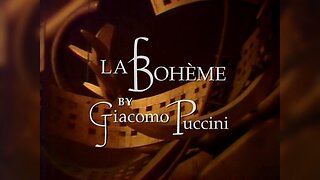 2:02:39
2:02:39
Adaneth - Arts & Literature
10 days agoLa Bohème | Scotto, Pavarotti, Wixell - Levine, Pizzi (MET 1977 - MULTISUB)
282 -
 10:19
10:19
Dr. Nick Zyrowski
4 days agoHigh Dose Vitamin D Treats Incurable Diseases? Shocking Details!
16.3K11 -
 16:14
16:14
Sponsored By Jesus Podcast
24 days agoCan Christians Get LIP FILLER? | Body Image, Beauty Standards & Battling Insecurity
16.3K4 -
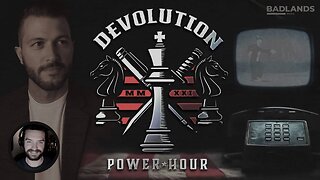 2:02:46
2:02:46
Badlands Media
15 hours agoDevolution Power Hour Ep. 414 – Spies, Lies & The Election-Integrity Trap
106K23 -
 2:58:17
2:58:17
TimcastIRL
10 hours agoWAR! US SEIZES Venezuelan Oil Tanker, War Feared Amid Escalation | Timcast IRL
328K185 -
 5:04:59
5:04:59
Drew Hernandez
1 day agoERIKA KIRK FINALLY CLAPS BACK: CANDACE OWENS RESPONDS
55.5K55 -
 35:33
35:33
Stephen Gardner
14 hours agoThe Supreme Court Just Changed History FOREVER!
135K100 -
 14:14
14:14
Robbi On The Record
13 days ago $13.21 earnedThe Identity Crisis No One Wants to Admit | Identity VS. Personality
80.3K17 -
 2:17:43
2:17:43
ThatStarWarsGirl
9 hours agoTSWG LIVE: Supergirl Is COMING!
56K4 -
 28:03
28:03
Welker Farms
14 hours ago $2.52 earnedNo Stopping The International Harvester 9370! ...except for that fuel leak...
40.6K2
